SWEDISH
SOUTH ASIAN STUDIES NETWORK
Newsletter 122:
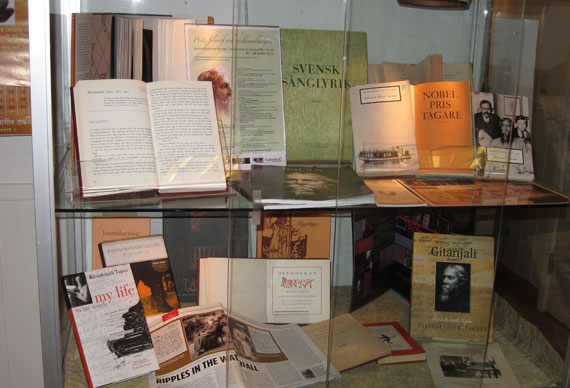 7 April 2011
7 April 2011
| Educational News |
| Lectures and seminars |
| Business and Politics |
| South Asia related Culture |
| New and updated information |
• Anna Lindberg reports from LU delegation visits to Indian universities
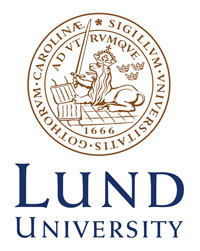 A high-level multi-disciplinary delegation from Lund University, led by Pro Vice-Chancellor Dr Eva Åkesson visited India on 21-25 March 2011. The reasons for the visit, partially planned for by the Swedish Embassy in New Delhi, are the already substantial collaborations with India and expectations of further increased cooperation in the coming years. The delegation consisted of deans and outstanding scientists, representing several of Lund University's faculties. SASNET’s Director, Dr. Anna Lindberg was part of the delegation, and visited among other institution Delhi University, Indian Institute of Technology Delhi (ITTD),
Indira Gandhi National Open University (IGNOU),
Jawaharlal Nehru University (JNU), National Campaign on Dalit Human Rights, and
Tata Institute of Social Science (TISS).
A high-level multi-disciplinary delegation from Lund University, led by Pro Vice-Chancellor Dr Eva Åkesson visited India on 21-25 March 2011. The reasons for the visit, partially planned for by the Swedish Embassy in New Delhi, are the already substantial collaborations with India and expectations of further increased cooperation in the coming years. The delegation consisted of deans and outstanding scientists, representing several of Lund University's faculties. SASNET’s Director, Dr. Anna Lindberg was part of the delegation, and visited among other institution Delhi University, Indian Institute of Technology Delhi (ITTD),
Indira Gandhi National Open University (IGNOU),
Jawaharlal Nehru University (JNU), National Campaign on Dalit Human Rights, and
Tata Institute of Social Science (TISS).
Read her report from the March 2011 India tour.
• Full-day SASNET
seminar on
Managing Diversity: The Indian Experience
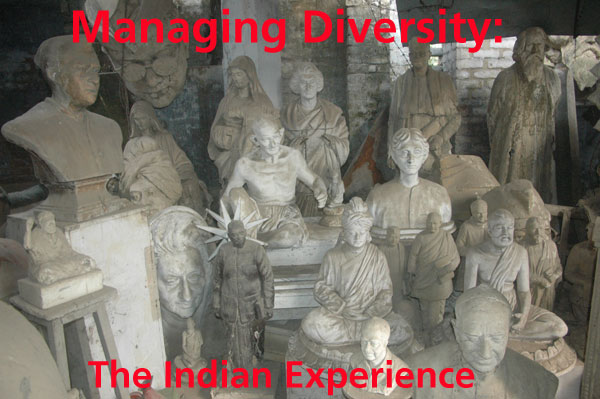 SASNET
organises a full-day seminar on "Managing Diversity: The Indian Experience",
in collaboration with the Embassy of India in Stockholm on Thursday 14 April 2011, 09.30–17.00
and with a concluding cultural programme from 17.30–19.30.
Venue for the seminar:
Pictura hall, 3rd floor, Main University Building (Universitetshuset), Paradisgatan 2, Lund.
SASNET
organises a full-day seminar on "Managing Diversity: The Indian Experience",
in collaboration with the Embassy of India in Stockholm on Thursday 14 April 2011, 09.30–17.00
and with a concluding cultural programme from 17.30–19.30.
Venue for the seminar:
Pictura hall, 3rd floor, Main University Building (Universitetshuset), Paradisgatan 2, Lund.
A welcome address will be delivered by Prof. Per Eriksson, Lund University Vice Chancellor, after which inaugural addresses will be given by
H.E. Mr. Göran Tunhammar, the Governor of Skåne County (Landshövding), and H.E. Ashok Sajjanhar,
Ambassador of India to Sweden and Latvia, who will introduce the theme for the day, Managing Diversity: The Indian Experience.
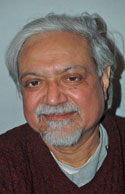 The academic speakers include Professor Sushil Khanna (photo to the left),
Indian Institute of Management Kolkata (but currently ICCR guest Professor at the Asia Research Centre, Copenhagen Business School) – read his CV. He will speak about ”Regional and Social Diversity: The New Bourgeoisie in India”.
The academic speakers include Professor Sushil Khanna (photo to the left),
Indian Institute of Management Kolkata (but currently ICCR guest Professor at the Asia Research Centre, Copenhagen Business School) – read his CV. He will speak about ”Regional and Social Diversity: The New Bourgeoisie in India”.
Dr. Stig Toft Madsen, Nordic Institute of Asian Studies (NIAS), Copenhagen, will speak about ”Managing External Complexities: India as a Soft Power”; Dr. Christina Nygren,
Visiting Research Fellow, Dept. of Oriental Languages, Stockholm University, will speak about ”Diversity in Indian theatre practices with special regard to folk traditions”;
and Professor Staffan Lindberg, Dept. of Sociology, Lund University, will speak about ”The Role of Industry and State Policies in Rural Development - A Tamil Nadu Perspective”.
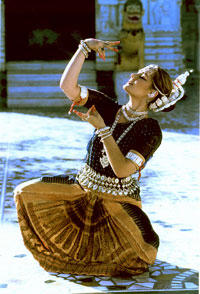 In the afternoon session devoted to business, Mr. Ulf Pehrsson,
Vice President, Government and Industry Relations at Ericsson, will give a presentation on ”Doing business in India”. Finally, SASNET’s director, Dr. Anna Lindberg will round off the seminar by heading a short summary session on ”Managing Diversity: The Indian Experience”.
In the afternoon session devoted to business, Mr. Ulf Pehrsson,
Vice President, Government and Industry Relations at Ericsson, will give a presentation on ”Doing business in India”. Finally, SASNET’s director, Dr. Anna Lindberg will round off the seminar by heading a short summary session on ”Managing Diversity: The Indian Experience”.
The seminar is organised as part of Lund City’s ongoing (11-17 April 2011) Round of Integration and Multitude (Lunds Integrations- och Mångfaldsrunda).
More information on this initiative.
After the seminar, on Thursday 14 April, from 17.30, a reception with cultural and social programme will be held at the Old Bishop’s House (Gamla Biskopshuset), Biskopsgatan 1, Lund. It is being hosted by the Embassy of India in Sweden.
Anette Pooja (photo to the right) from Gothenburg will perform a classical Odissi dance performance, and Ms. Sri Kripa will sing.
Registration for the seminar and the cultural programme should be made by sending an e-mail to Lars.Eklund@sasnet.lu.se not later than Friday 8 April 2011.
More information about the 14th April SASNET seminar.
See the conference poster.
• Anna Lindberg reports from April 1st EASAS Council meeting in Paris
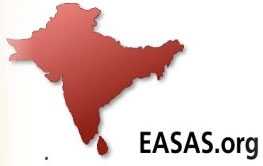 On 1 April 2011, SASNET’s director Dr. Anna Lindberg participated in the European Association of South Asian Studies (EASAS) Council meeting. The meeting was held at L’Ecole des Hautes Etudes en Sciences Sociales (EHSS) in Paris. The following members were present: Professor Roger Jeffrey (University of Edinburgh, President EASAS);
Dr. Margret Frenz (University of Leister, Vice President EASAS);
Professor Ulrike Müller-Böker (University of Zürich, Treasurer EASAS);
Dr. Heinz-Werner Wessler (University of Uppsala;
Professor Danuta Stasik (University of Warzaw);
Dr. Nicolas Jaoul (EHESS; and
Dr. Anna Lindberg (SASNET/Lund University.
On 1 April 2011, SASNET’s director Dr. Anna Lindberg participated in the European Association of South Asian Studies (EASAS) Council meeting. The meeting was held at L’Ecole des Hautes Etudes en Sciences Sociales (EHSS) in Paris. The following members were present: Professor Roger Jeffrey (University of Edinburgh, President EASAS);
Dr. Margret Frenz (University of Leister, Vice President EASAS);
Professor Ulrike Müller-Böker (University of Zürich, Treasurer EASAS);
Dr. Heinz-Werner Wessler (University of Uppsala;
Professor Danuta Stasik (University of Warzaw);
Dr. Nicolas Jaoul (EHESS; and
Dr. Anna Lindberg (SASNET/Lund University.
Discussion were held regarding the upcoming 22nd EASAS conference to be held in Lisbon, Portugal in July 2012 (more information), and also future conferences in 2014 and 2016. The Council also discussed EASAS’ updated web page, www.easas.org, and all agreed that it has improved greatly, thanks to design work carried out by Ms. Julia Velkova from SASNET.
Finally, the Council members welcomed the coming collaboration between EASAS and SAMAJ – a peer reviewed on-line academic journal run by researchers from the Centre for South Asian Studies at EHESS. Dr. Loraine Kennedy and Dr. Stephanie Tawa Lama-Rewal, both from Centre for South Asian Studies at EHESS, were also present at this part of the meeting.
• SASNET/Swallows joint seminar on Forest Rights in India
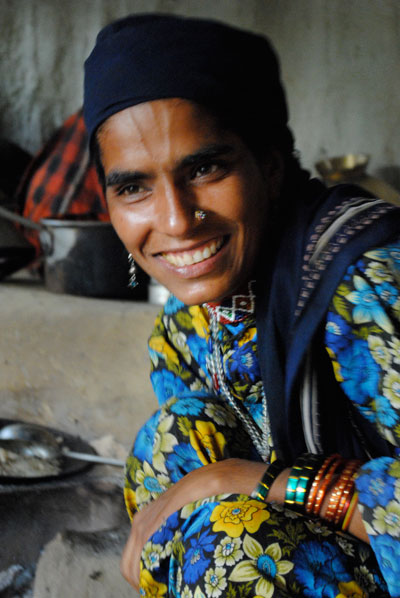 The Swedish South Asian Studies Network (SASNET) at Lund University,
and The Swallows India Bangladesh jointly organise a seminar on ”Forest Rights in India” on Wednesday 4 may 2011, 13.00–17.00. The seminar is organised because 2011 has been selected to be the United Nation's International Year of Forests. Issues related to forests and deforestation in India will be discussed, as well as the problems that the tribal people who live there face.
The Swedish South Asian Studies Network (SASNET) at Lund University,
and The Swallows India Bangladesh jointly organise a seminar on ”Forest Rights in India” on Wednesday 4 may 2011, 13.00–17.00. The seminar is organised because 2011 has been selected to be the United Nation's International Year of Forests. Issues related to forests and deforestation in India will be discussed, as well as the problems that the tribal people who live there face.
Speakers include Dr. Beppe Karlsson, Dept. of Social Antropology, Stockholm University, who will talk about ”The Wet Desert and the Sacred Grove: Environmental Narratives in
Northeast India"; Dr. Pernille Gooch, Human Ecology Division, Lund University, who will talk about "Victims of Conservation or Rights as Forest Dwellers: Van Gujjar Pastoralists between Contesting Codes of Law": and Praveen Kaushal Manto from SOPHIA organisation in India, who will talk about ”Forest Rights – examples from The Himalayas & The Van Gujjars stategies for survival". Venue: Geocentrum I, room Världen, Sölvegatan 10, Lund.
More information about the Forest Rights seminar.
 |
• High time to apply for participation in the SASNET/NIAS 2011 Falsterbo conference
The First Call for Papers for the Third Nordic Conference on South Asian Studies for Young Scholars has been published. The Swedish South Asian Studies Network (SASNET) and the Nordic Institute of Asian Studies (NIAS) are organizing the Third Nordic Conference on South Asian Studies for Young Scholars to be held from 16–18 August 2011 in Falsterbo, Sweden. The conference will be a gathering of graduate students and postdocs, along with other junior scholars affiliated with universities in the Nordic countries (Denmark, Finland, Norway, and Sweden) who are focusing on South Asia in their work.
 Keynote speaker this year will be Professor Patricia Jeffery (photo to te left) from the School of Social and Political Science,
University of Edinburgh, UK. The conference is interdisciplinary and this year's main topics will be – Gender Issues; – Climate Change; – Mentality and Local Culture; – ICT and Development, as well as – Alternative Career paths beyond the academia, with a focus on the South Asian region.
Keynote speaker this year will be Professor Patricia Jeffery (photo to te left) from the School of Social and Political Science,
University of Edinburgh, UK. The conference is interdisciplinary and this year's main topics will be – Gender Issues; – Climate Change; – Mentality and Local Culture; – ICT and Development, as well as – Alternative Career paths beyond the academia, with a focus on the South Asian region.
The previous two conferences (more information) differed from the usual academic conferences in paying attention explicitly to students. Positive evaluations were received from all participants and we are looking forward to having a productive and engaging event this year!
Deadline for submitting an abstract with a current or projected research project has been extended till Monday 9 May 2011. Note: those studying for their masters, Ph.D. candidates, and postdoctoral researchers in all disciplines who are affiliated with Nordic universities are invited to apply. However, if space permits, young scholars from other European Universities will also be welcome, so are also encouraged to send in an application at this time.
More information on the 2011 conference web page.
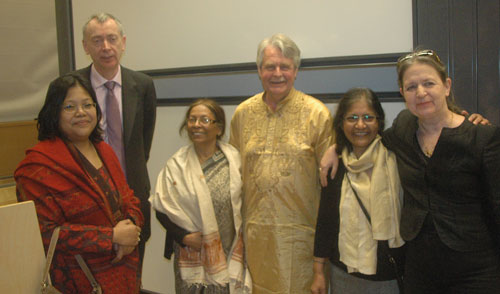 |
| Participants at the March 22nd seminar: Madhumita Bhagat, William Radice, Bubu Munshi Eklund, Lars Eklund, Alia Ahmad, and Annemette Karpen. |
• Success for SASNET’s
Rabindranath Tagore
Week
SASNET successfully organised a Rabindranath Tagore 150th birth anniversary celebration week in Lund 20–24 March 2011. In collaboration with other local institutions and organisations, the week included popular lectures by by Dr. Olavi Hemmilä and P-O Henricson, Swedish experts on Rabindranath’s life and literature, as well as exhibitions, film shows, concerts and poetry reading.
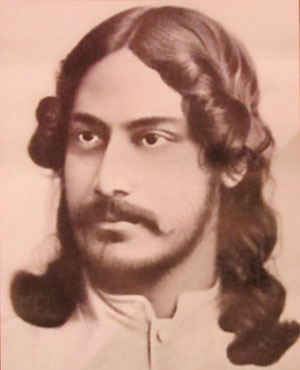 On Tuesday 22 March, SASNET and Lund University organised a well-atttended academic seminar, featuring Prof. Wiliam Radice from SOAS, University of London. Prof. Radice, who has made new inspiring translations of Tagore’s poetry and prose from Bengali into English – a new volume of Gitanjali will be published in May 2011, spoke extensively and passionately about the relevance still present in his literature. More information on Prof. Radice’s lecture.
On Tuesday 22 March, SASNET and Lund University organised a well-atttended academic seminar, featuring Prof. Wiliam Radice from SOAS, University of London. Prof. Radice, who has made new inspiring translations of Tagore’s poetry and prose from Bengali into English – a new volume of Gitanjali will be published in May 2011, spoke extensively and passionately about the relevance still present in his literature. More information on Prof. Radice’s lecture.
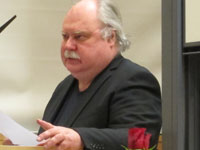 |
 |
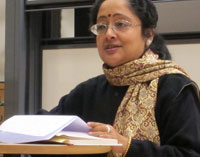 |
| Claes-Göran Holmberg, Gabrielle Gunneberg and Lipi Ghosh. | ||
The seminar programme, prepared by SASNET’s deputy director Lars Eklund, also included lectures by Dr. Claes-Göran Holmberg, Comparative Literature, Centre for Languages and Literature, who talked about ”Tagore in Sweden and the Nobel Prize of 1913”, and Mag. Art Annemette Karpen from Copenhagen who talked about ”Tagore’s Drama Production, and Satyajit Ray’s films based on Tagore works”. Free-lance journalist Gabrielle Gunneberg talked about Tagore’s Nobel prize medal that were stolen from Santiniketan in 2004. Prof. Lipi Ghosh from Calcutta University, and currently ICCR guest professor at Lund University, recited poems by Rabindranath Tagore, and Bubu Munshi Eklund sang some of his songs. Ms. Madhumita Bhagat, First Secretary, Embassy of India, was the chief guest-of -honour.
Full information about the March 2011 Tagore Week in Lund.
See Lars Eklund’s photos from the Tagore Week.
Listen (on Youtube) to the Swedish choir Svart på Vitt singing Tagore’s song Ontoro Momo Bikoshito Koro as part of the Tagore Week. Please note a well-known male singer in the choir.
Other Tagore seminars in Sweden and Denmark will take place in September 2011
in collaboration with the Indian embassies in Scandinavia, and with support from the Indian Council for Cultural Relations (ICCR). Leading South Asian Tagore scholars have already been invited for these occasions. More information will follow in due time.
• Lund University’s first ICCR Professor returned to India
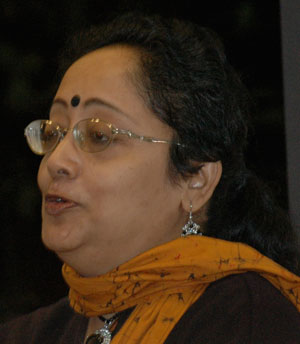 Professor Lipi Ghosh from the Dept. of South and South East Asian Studies, Calcutta University in Kolkata, India served as the first Visiting ICCR (Indian Council for Cultural Relations) Chair Professor at Lund University.
She stayed in Sweden from November 2010 till 5 April 2011. During this period she was hosted by the Faculty of Social Sciences, and had a workplace at the university’s Centre for Gender Studies.
As a visiting professor at Lund University, Prof. Ghosh was primarily engaged in research, but also took an active role in teaching.
Professor Lipi Ghosh from the Dept. of South and South East Asian Studies, Calcutta University in Kolkata, India served as the first Visiting ICCR (Indian Council for Cultural Relations) Chair Professor at Lund University.
She stayed in Sweden from November 2010 till 5 April 2011. During this period she was hosted by the Faculty of Social Sciences, and had a workplace at the university’s Centre for Gender Studies.
As a visiting professor at Lund University, Prof. Ghosh was primarily engaged in research, but also took an active role in teaching.
The ICCR professorship at Lund University is an outcome of a Memorandum of Understanding between the Indian Council for Cultural Relations (ICCR) and Lund University, that was signed on 22 June 2010 by Mr. Balkrishna Shetty, former Indian Ambassador to Sweden, and Prof. Per Eriksson, Vice-Chancellor, Lund University. In a first phase, the agreement is valid for four years, with a new Indian Professor to be selected each year.
SASNET was actively involved in finalizing the ICCR professorship at Lund University, with strong support from the Embassy of India in Stockholm.
A new ICCR Visiting Professor will come to Lund University in September 2011. More information will follow.
• SASNET lecture on Dharavi: Documenting Informalities
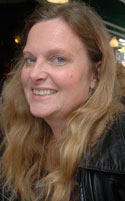 Associate Professor Maria Lantz from the Dept. of Art & Architecture at Royal Institute of Art (KKH), Stockholm, held a SASNET/Lund University seminar on Thursday 31 March 2011, 09.15–12.00. Her lecture was entitled ”Informal Cities” and is based on a 2008 book about the Dharavi slums in Mumbai, India, produced by Dr. Lantz and colleagues at KKH in collaboration with local organisations. The name of the book was ”Dharavi: Documenting Informalities” (more information).
The seminar was hosted by the Division of Housing Development and Management, Dept. of Architecture
and Built Environment, Lund University. Venue for the seminar: Design Lilla Hörsalen (DC:Lhö), Ingvar Kamprad Design Centre, Sölvegatan 26, Lund.
Associate Professor Maria Lantz from the Dept. of Art & Architecture at Royal Institute of Art (KKH), Stockholm, held a SASNET/Lund University seminar on Thursday 31 March 2011, 09.15–12.00. Her lecture was entitled ”Informal Cities” and is based on a 2008 book about the Dharavi slums in Mumbai, India, produced by Dr. Lantz and colleagues at KKH in collaboration with local organisations. The name of the book was ”Dharavi: Documenting Informalities” (more information).
The seminar was hosted by the Division of Housing Development and Management, Dept. of Architecture
and Built Environment, Lund University. Venue for the seminar: Design Lilla Hörsalen (DC:Lhö), Ingvar Kamprad Design Centre, Sölvegatan 26, Lund.
• More information about SASNET and its
activities
See SASNET’s page, http://www.sasnet.lu.se/sasnet.html
• Partner Driven Cooperation grants for nine Indo-Swedish collaboration projects
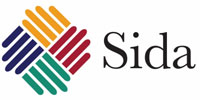 In July 2010, the Swedish International Development Cooperation Agency (Sida), through its program for Partner Driven Cooperation (Aktörssamverkan), announced a call for applications for grants to collaborative projects related to access to and use of research for the period 2010 – 2012. This program is not support to research but rather assisting partners in assessing and using research in policy formulation and innovation. Sida’s initiative for Partner Driven Cooperation is aiming to support sustainable cooperation relationships, and concerns only a few selected countries, namely China, India, Indonesia, Vietnam, South Africa, Botswana and Namibia.
In July 2010, the Swedish International Development Cooperation Agency (Sida), through its program for Partner Driven Cooperation (Aktörssamverkan), announced a call for applications for grants to collaborative projects related to access to and use of research for the period 2010 – 2012. This program is not support to research but rather assisting partners in assessing and using research in policy formulation and innovation. Sida’s initiative for Partner Driven Cooperation is aiming to support sustainable cooperation relationships, and concerns only a few selected countries, namely China, India, Indonesia, Vietnam, South Africa, Botswana and Namibia.
Grants are for maximum three years (2010-2012) and for a maximum of 1.5 MSEK per year. Sida has reserved 30 million Swedish crowns (SEK) per year 2010-2012 for this call. More information.
In December 2010, decisions were made. A total number of 32 projects were selected (see the full list), out of which nine refers to Indo-Swedish collaboration projects.
The Swedish grant recipients are:
– Professor Elsy Athlin, Department of Nursing Science, Karlstad University, for a project entitled ”Collaboration between academy and clinical practice to promote evidence-based practice in India and Swedish health care”. SEK 4.3 m for three years (2010-12).
– Professor Abul Mandal (photo), School of Life Sciences, Skövde University, for a project entitled ”Bioremediation of toxic metals and other pollutants for protecting human health and the ecosystem”. SEK 4.5 m for three years (2010-12). More information about the project.
– Professors Tina Wik and Henrietta Palmér, Royal Institute of Art (KKH), Stockholm, for a project entitled ”Inclusive Planning for Developing Urban India”. SEK 2.77 m for two years (2010-11). More information about the project.
– Professor Örjan Gustafsson (photo to the left), Department of Applied Environmental Science, Stockholm University, for a project entitled ”Climate and health-afflicting “Brown Air” in northern India: evaluation of sources, advise on mitigation options and advocacy for action”. SEK 4.2 m for three years (2010-12).
– Dr. Maria Tengö (photo to the right), Department of Systems Ecology, Stockholm University, for a project entitled ”Bridging the science-policy gap for governance of ecosystem services – lessons learned from sacred ecosystems”. SEK 4.17 m for three years (2010-12).
– Dr. Pia Olsson (photo to the left), International Maternal and Child Health (IMCH), Department of Women’s and Children’s Health, Uppsala University, for a project entitled ”Using evidence-based advocacy to improve infant and young child health and survival in India”. SEK 4.5 m for three years (2010-12).
– Professor Vinod Diwan (photo to the right), Division of Global health (IHCAR), Karolinska Institutet Medical University, Stockholm, for a project entitled ” Evidence for policy and implementation – intensifying efforts to achieve health related MDGs in four Asian countries with developing economies (EPI-7) India, China, Vietnam, Indonesia”. SEK 12 m for three years (2010-12).
– Dr. Cecilia Ruben, Stockholm Environment Institute (SEI), for a project entitled ”Enhanced Sustainable Sanitation Provision in Flooded Areas of India: Researchers and Practitioners Collaborate for Policy Reform and MDG Fulfillment”. SEK 3.9 m for three years (2010-12).
– Dr. Mannan Mridha (photo), Division of Medical Engineering, School of Technology and Health (STH), Royal Institute of Technology (KTH), Stockholm, for a project entitled ”Development of cost-effective and Mobile Diagnostic Systems for application in the developing countries”. SEK 1.4 m for two years (2010-11).
• Apply for SIDA development research grants before April 12th
![]() The deadline to apply for funding for research projects and postdoctoral support from the Swedish
International Development Cooperation Agency (Sida) for the period 2012–2014 is Tuesday 12 April 2011. Sida provides grants
to support Swedish development research through its Developing
Country Research Council (u-landsforskningsrådet).
These so-called uforsk grants belong to the most
important ways of financing Swedish research projects related to developing
countries, including South Asia (see SASNET’s information about South Asia related grants from 2003-2010). The aim is to establish and maintain
a knowledge base of relevance to aid and development issues, plus
capacity for developing country research in Sweden. Researchers working at universities/colleges or other
research institutions in Sweden may apply for grants.
The deadline to apply for funding for research projects and postdoctoral support from the Swedish
International Development Cooperation Agency (Sida) for the period 2012–2014 is Tuesday 12 April 2011. Sida provides grants
to support Swedish development research through its Developing
Country Research Council (u-landsforskningsrådet).
These so-called uforsk grants belong to the most
important ways of financing Swedish research projects related to developing
countries, including South Asia (see SASNET’s information about South Asia related grants from 2003-2010). The aim is to establish and maintain
a knowledge base of relevance to aid and development issues, plus
capacity for developing country research in Sweden. Researchers working at universities/colleges or other
research institutions in Sweden may apply for grants.
The proposed research projects should have a clear relevance for Sweden’s policy for global development, in accordance with the Swedish Policy for Global Development and the Strategy for Sida’s support to research cooperation 2010-2014. This implies that the application should have a land focus in accordance with the Swedish government’s priorities – which in the South Asia case means primarily Bangladesh and Afghanistan and in a selective mode also India.
During 2012 the total amount to be granted is SEK 120 m of which SEK 40 m is available for new applications. The maximum amount that can be applied for is SEK 1.5 m per year for up to three years.
Read the announcement for grants.
• No Call for Swedish Research Links grants in 2011
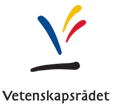 No grants were distributed from the Swedish Research Links programme in 2010, and neither has any new call been announced in 2011. Swedish Research Links grants were introduced
by the Swedish International Development Cooperation Agency (Sida), and the Swedish
Research Council in 2002, with an aim to stimulate
cooperation between researchers in Sweden and those in developing countries, including South Asia (see SASNET’s information about South Asia related grants from 2002-2009).
No grants were distributed from the Swedish Research Links programme in 2010, and neither has any new call been announced in 2011. Swedish Research Links grants were introduced
by the Swedish International Development Cooperation Agency (Sida), and the Swedish
Research Council in 2002, with an aim to stimulate
cooperation between researchers in Sweden and those in developing countries, including South Asia (see SASNET’s information about South Asia related grants from 2002-2009).
The programme was evaluated during 2010, and Sida is now discussing a future programme. The Swedish Research Council waits for the result of these discussions before it can give any further information about a new call. More information.
Applications for ordinary project grants from the Swedish Research Council should have been submitted before 30 March 2011 (regarding
Humanities and Social Sciences; and
Artistic Research & Development); before 6 April (regarding Medicine and Health); 13 April (regarding
Natural and Engineering Sciences); 19 April (regarding
Educational Sciences; and
Research Infrastructures). Full information about the general announcement.
• Indian Visiting Professor at School of Business, Economics and Law in Gothenburg
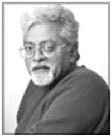
 Since 2009, Professor Ramnath Narayanswamy is a Visiting Professor to the School of Business, Economics and Law, University of Gothenburg, spending extended periods in Gothenburg. The previous two years, 2009 and 2010 were mostly spent there, since he decided to take his sabbatical. He then nearly completed a book on Growing Leaders (which will soon be published). Prof. Narayanswamy is otherwise a Professor in the Economics and Social Sciences Area at the Indian Institute of Management in Bangalore (IIMB). His areas of interest include Business and Society, Spirituality and Self Development, Entrepreneurship in the Creative Sector and Creativity and Innovation. More information about Prof. Narayanswamy.
Since 2009, Professor Ramnath Narayanswamy is a Visiting Professor to the School of Business, Economics and Law, University of Gothenburg, spending extended periods in Gothenburg. The previous two years, 2009 and 2010 were mostly spent there, since he decided to take his sabbatical. He then nearly completed a book on Growing Leaders (which will soon be published). Prof. Narayanswamy is otherwise a Professor in the Economics and Social Sciences Area at the Indian Institute of Management in Bangalore (IIMB). His areas of interest include Business and Society, Spirituality and Self Development, Entrepreneurship in the Creative Sector and Creativity and Innovation. More information about Prof. Narayanswamy.
Prof. Narayanswamy is one of a number of visiting professors who spend time at the School of Business, Economics and Law as part of its International Visiting Professor Programme for the period 2009–13. This programme contributes to a concious strategy of improving the international profile and competitiveness of the School of Business Economics and Law by increasing the share of international researchers within the faculty. It is also part of a long-term internationalisation strategy which involves building deeper relations with a number of esteemed universities and business schools around the world. Visiting Professors serving on the programme are typically contracted for a three-year engagement, and typically work at the School for one month per academic term. By mid-2010 there were 22 visiting professors contracted to the programme and this will rise to about 30 by mid-2011. The programme has been made possible thanks to generous contributions from the business community in West Sweden. More information on the International Visiting Professor Programme.
• Copenhagen offers PhD Scholarship on Confinement and Violence in India
The Department of Cross-Cultural and Regional Studies (ToRS), the Faculty of Humanities, University of Copenhagen and the Rehabilitation and Research Centre for Torture Victims (RCT), also in Copenhagen, announces a PhD Scholarship on Confinement and Violence in India. The two institutions search for a highly qualified candidate for a jointly funded project on forms, modes, experiences and economies of confinement with a particular orientation towards prisons and/or urban neighbourhoods. While torture, violence and abuse of human rights in prisons and urban neighbourhoods has been the subject of scholarly explorations, the functional similarities between urban slums and places of detention have received scant attention. The project should broadly speak to themes of confinement, violence and reform in the Indian context. The more specific focus of the project will be developed by the successful candidate in collaboration with ToRS and RCT.
The prospective candidate should have a relevant academic background, an ethnographic orientation and an ability to work in a transdisciplinary manner. Prior knowledge of India and linguistic competences would be an advantage but not a pre-requisite. Expected start: September 1st 2011.
The successful candidate would be affiliated to both ToRS and the RCT. At ToRS the candidate would be located at the Centre of Global South Asian Studies, and at RCT the candidate will be an integral part of RCT’s Confinement Programme.
Full information about the PhD scholarship.
• Useful Sri Lanka Research website for scholars
 Sri Lanka Research website is a comprehensive website devoted to providing access to scholarly articles and information about Sri Lanka. This resource enables researchers to locate hard to find information resources not accessible via other bibliographic databases and sources.
The web site includes a searchable index to journal articles published in Sri Lanka from 1845 – to date. At present, the database contains over 10,000 citations from scholarly journals in the Humanities and Social Sciences, Agriculture and the Sciences. The Sri Lanka Research website also provides links to major universities, libraries and research organizations facilitating access to major holdings and resource persons.
Sri Lanka Research website is a comprehensive website devoted to providing access to scholarly articles and information about Sri Lanka. This resource enables researchers to locate hard to find information resources not accessible via other bibliographic databases and sources.
The web site includes a searchable index to journal articles published in Sri Lanka from 1845 – to date. At present, the database contains over 10,000 citations from scholarly journals in the Humanities and Social Sciences, Agriculture and the Sciences. The Sri Lanka Research website also provides links to major universities, libraries and research organizations facilitating access to major holdings and resource persons.
This database of scholarly resources was supported by a research grant from the Librarians’ Association of University of California, Riverside where Geetha Yapa works as
Science Reference Librarian. Go for the Sri Lanka Research website.
• India largest arms importer according to SIPRI’s Arms Transfers Database
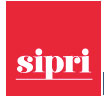 On 14 March 2011, Stockholm International Peace Research Institute (SIPRI) presented the 2011 comprehensive annual update of its Arms Transfers Database. It indicates with new data that India has become the world's largest arms importer.
India received 9 per cent of the volume of international arms transfers during 2006–10, with Russian deliveries accounting for 82 per cent of Indian arms imports.
On 14 March 2011, Stockholm International Peace Research Institute (SIPRI) presented the 2011 comprehensive annual update of its Arms Transfers Database. It indicates with new data that India has become the world's largest arms importer.
India received 9 per cent of the volume of international arms transfers during 2006–10, with Russian deliveries accounting for 82 per cent of Indian arms imports.
‘Indian imports of major conventional weapons are driven by a range of factors. The most often cited relate to rivalries with Pakistan and China as well as internal security challenges’, states Siemon Wezeman of the SIPRI Arms Transfers Programme. ‘As an importer, India is demanding offsets and transfers of technology to boost its own arms industry, and, in order to secure orders, major suppliers are agreeing to such demands’. More information.
Go for the
SIPRI Arms Transfers Database.
• Heinz Werner Wessler keynote speaker at Mumbai conference
On 7–8 March 2011, Dr. Heinz Werner Wessler, Department of Linguistics and Philology, Uppsala University was the keynote speaker at a conference on ”The international Form of Hindi Literature” (Hindi sahitya ka antarrastriy svarup) at the University of Mumbai, India. More than 700 academics, mostly readers, lecturers and professors for Hindi from universities and colleges all over India participated in the event that was organised by the Department of Hindi, University of Mumbai. More information.
• UNRISD Provocative Seminar series on Third World Small-Scale Farmers
 During the period 28 September 2010 – 22 june 2011, United Nations Research Institute for Social Development (UNRISD), based in Geneva, organizes a travelling series of provocative seminars, “Making Markets Work” for Small-Scale Farmers? A Series of Provocations”, examining the assumptions, impacts, evidence, benefits and risks of “making markets work” for small-scale farmers. Billed as "provocations", each seminar in the series brings invited "provokers" together with local and international participants for three hours of debate, streamed and interactive on the web. The series is organized by a consortium of research and advocacy organizations, led by the International Institute for Environment and Development (IIED), Hivos Knowledge Programme, and Mainumby. As a collaborating partner, UNRISD will co-host a provocation on inclusive business and producer empowerment in June 2011. More information about the UNRISD provocative seminar series.
During the period 28 September 2010 – 22 june 2011, United Nations Research Institute for Social Development (UNRISD), based in Geneva, organizes a travelling series of provocative seminars, “Making Markets Work” for Small-Scale Farmers? A Series of Provocations”, examining the assumptions, impacts, evidence, benefits and risks of “making markets work” for small-scale farmers. Billed as "provocations", each seminar in the series brings invited "provokers" together with local and international participants for three hours of debate, streamed and interactive on the web. The series is organized by a consortium of research and advocacy organizations, led by the International Institute for Environment and Development (IIED), Hivos Knowledge Programme, and Mainumby. As a collaborating partner, UNRISD will co-host a provocation on inclusive business and producer empowerment in June 2011. More information about the UNRISD provocative seminar series.
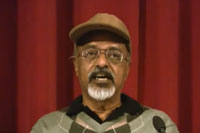 The second seminar was held in Stockholm on 3 March 2011, and focused on ”Rights-based versus market-based development: a false dichotomy for small-scale farmers? ” This seminar was co-hosted by the Swedish International Agricultural Network Initiative (SIANI), the Swedish International Development Cooperation Agency (Sida) and the Swedish Cooperative Centre (SCC). Mr. P.V. Satheesh (photo) from the Deccan Development Society was one of the invited speakers. More information on the Stockholm seminar.
The second seminar was held in Stockholm on 3 March 2011, and focused on ”Rights-based versus market-based development: a false dichotomy for small-scale farmers? ” This seminar was co-hosted by the Swedish International Agricultural Network Initiative (SIANI), the Swedish International Development Cooperation Agency (Sida) and the Swedish Cooperative Centre (SCC). Mr. P.V. Satheesh (photo) from the Deccan Development Society was one of the invited speakers. More information on the Stockholm seminar.
The third and coming seminar in the series was entited ”Making Markets Work for the Poor: Contents and Discontents” and took place in Paris on 30 March 2011. It was co-hosted by the Institut de Recherches et d’Applications des Méthodes de Développement (IRAM) and SNV Netherlands Development Organisation.
The seminar can be viewed as video recordings from 30 March 2011. More information.
• Rural Poverty Report 2011 from IFAD
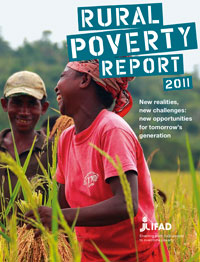 In December 2010, the
International Fund for Agricultural Development (IFAD) presented its
Rural Poverty Report 2011, with the theme ”New realities, new challenges: new opportunities for tomorrow’s generation”.
This is a globally significant report which is released every decade. It provides a coherent and comprehensive look at rural poverty, its global consequences and the prospects for eradicating it.
The report contains updated estimates by IFAD regarding how many rural poor people there are in the developing world, poverty rates in rural areas, and the percentage of poor people residing in rural areas. The report also looks at changes to agricultural markets and new opportunities for rural women and men. Go for the Rural Poverty Report 2011.
In December 2010, the
International Fund for Agricultural Development (IFAD) presented its
Rural Poverty Report 2011, with the theme ”New realities, new challenges: new opportunities for tomorrow’s generation”.
This is a globally significant report which is released every decade. It provides a coherent and comprehensive look at rural poverty, its global consequences and the prospects for eradicating it.
The report contains updated estimates by IFAD regarding how many rural poor people there are in the developing world, poverty rates in rural areas, and the percentage of poor people residing in rural areas. The report also looks at changes to agricultural markets and new opportunities for rural women and men. Go for the Rural Poverty Report 2011.
• South Asia related fellowships at London School of Economics & Political Science
 The Asia Research Centre (ARC) at London School of Economics & Political Science (LSE) invites applications for a number of South Asia related fellowships:
The Asia Research Centre (ARC) at London School of Economics & Political Science (LSE) invites applications for a number of South Asia related fellowships:
– The Sir Ratan Tata Foundation at LSE invites applications for the Sir Ratan Tata Fellowship 2011/12, now in its fifteenth year. Applicants should be established scholars in the social sciences with experience of research on South Asia. Applicants should hold a PhD or comparable qualifications and experience – the fellowship is not intended for students registered for a degree or diploma, nor is it intended for senior academics. The Fellowship is open to candidates from South Asia, that is, the SAARC region which includes Bangladesh, Bhutan, India, Maldives, Nepal, Pakistan and Sri Lanka. Final date for applications is Monday 16 May 2011. More information.
– The CR Parekh Fellowship 2010/11 is available for established scholars in the social sciences with experience of research on India. Applicants should hold a PhD or comparable qualifications and experience – the fellowship is not intended for students registered for a degree or diploma, nor is it intended for senior academics. The Fellow will be expected to engage in research on a topic under the following themes: Poverty, Inequality, Human Development and Social Exclusion; Quality of Public Life; Regional Disparities; Identities – Gender, Ethnicity, Language; Economy and Environment; Political Structures and Processes; and Constitutional Debates. Preference will be given to topics that focus on social, economic, political and constitutional concern to India. The Fellowship is open to candidates from India only. Final date for applications is Monday 16 May 2011. More information.
– Applications are also invited for the second Subir Chowdhury Fellowship on Quality and Economics. It is supported by the Subir and Malini Chowdhury Foundation. Applicants should be scholars in the social sciences with experience of research on Bangladesh and India. Applicants should hold a PhD or comparable qualifications and experience – the fellowship is not intended for students registered for a degree or diploma. The ‘Subir Chowdhury Fellowship on Quality and Economics’ will be for a period of three months after January 2011, and will be based at the Asia Research Centre at the LSE. The Fellow will be expected to engage in research examining the impact of people quality and behaviour on the economies of Asian nations prioritising, but not restricted to, India and Bangladesh. The Fellowship allows for any scholar to participate in the programme regardless of ethnicity or national origin. Final date for applications is Monday 16 May 2011. More information.
• More information about South Asia related
research at Swedish and Nordic universities
See SASNET’s page, http://www.sasnet.lu.se/research.html
 |
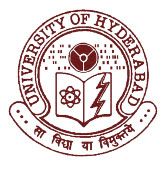 |
• Nordic Centre in India semester programme at University of
Hyderabad
The Nordic Centre in India (NCI) organises full semester
programmes for Nordic students at the University of Hyderabad.
The Nordic Centre has made an arrangement with the University
of Hyderabad and its Study India Program (SIP) to allow
15 Nordic students to be admitted there, and to take courses
on various social science and humanities subjects. The aim of the agreement is to allow Nordic students to study India in India, to give them both a sound academic knowledge of India as well as the experience you only gain by living there. In most cases, the UoH degree should count towards you final degree at your home university.
Please note that applicants must come from the Nordic universities that are members of the NCI consortium. The Hyderabad semester last from third week of July to
first week of December and from first week of January to
first week of May every year. Deadlines for sending in your application: –
Spring Semester: November 9th: –
Fall Semester: March 15th.
More
information about the Hyderabad semester programme.
• Time to apply for Contemporary India summer course in Hyderabad
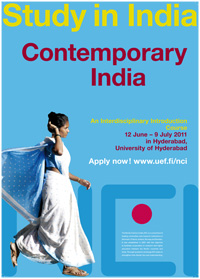 For the ninth time the course
'Contemporary India' will be held in the Summer 2011 (12 June – 9 July) at the
University of Hyderabad, in collaboration with the
Nordic Centre in India. The course, running for four weeks, is tailor-made for Nordic students and introduces issues
of politics, culture and economy. It consists of the following
five parts: Introductory course: The diversity of
India:
The political system and questions of identity:
Globalisation and the economy focusing on the city of Hyderabad:
Development, environment and human rights: and Indian
literature and cinema. The students coming from most Nordic
countries (and universities that are members of the Nordic
Centre in India) are given board and lodging in an excellent
guest house. Each member university nominates their candidates
and reserves on this course. At Lund University, the deadline for applications for the 2011 course is 12 April. More
information about the Hyderabad summer course.
For the ninth time the course
'Contemporary India' will be held in the Summer 2011 (12 June – 9 July) at the
University of Hyderabad, in collaboration with the
Nordic Centre in India. The course, running for four weeks, is tailor-made for Nordic students and introduces issues
of politics, culture and economy. It consists of the following
five parts: Introductory course: The diversity of
India:
The political system and questions of identity:
Globalisation and the economy focusing on the city of Hyderabad:
Development, environment and human rights: and Indian
literature and cinema. The students coming from most Nordic
countries (and universities that are members of the Nordic
Centre in India) are given board and lodging in an excellent
guest house. Each member university nominates their candidates
and reserves on this course. At Lund University, the deadline for applications for the 2011 course is 12 April. More
information about the Hyderabad summer course.
• NCI Summer course on Environmental issues at ISEC in Bangalore
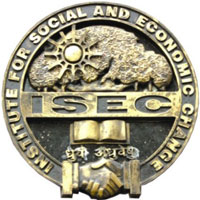 For the fifth year, NCI offers a 7.5 ECTS summer course on environmental issues in India, in Bangalore during the period 10 July – 6 August 2011. The course titled “Approaching
the Environment in India. New theories and methods in the study of the nature-society interface”, is organised in collaboration
with the Institute for Social and Economic Change (ISEC)
in Bangalore. It is a four-weeks multi-disciplinary course for graduate and post-graduate
students from the Nordic countries, that seeks to introduce
students to recent theories and methods in the study of contemporary
environmental issues in India. Each member university nominates their candidates
and reserves on this course. At Lund University, the deadline for applications for the 2011 course is 12 April.
For the fifth year, NCI offers a 7.5 ECTS summer course on environmental issues in India, in Bangalore during the period 10 July – 6 August 2011. The course titled “Approaching
the Environment in India. New theories and methods in the study of the nature-society interface”, is organised in collaboration
with the Institute for Social and Economic Change (ISEC)
in Bangalore. It is a four-weeks multi-disciplinary course for graduate and post-graduate
students from the Nordic countries, that seeks to introduce
students to recent theories and methods in the study of contemporary
environmental issues in India. Each member university nominates their candidates
and reserves on this course. At Lund University, the deadline for applications for the 2011 course is 12 April.
More
information about the Bangalore summer course.
• NCI summer course on Demography,
Gender and Reproductive Health in Mumbai
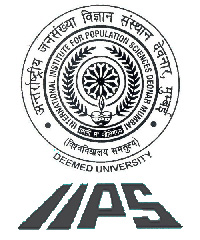 For the fifth year, NCI also offers a 7.5 ECTS summer course on “Demography,
Gender and Reproductive Health”, in Mumbai during the period 10 July to 6 August 2011. It is an an introduction to population studies
in India, organised in collaboration with the International Institute for Population
Science (IIPS) in Mumbai in collaboration with NCI. The course
is a multi-disciplinary course that is open for under-graduate
and graduate students from the Nordic countries. Each member university nominates their candidates
and reserves on this course. At Lund University, the deadline for applications for the 2011 course is 12 April. More
information about the Mumbai summer course.
For the fifth year, NCI also offers a 7.5 ECTS summer course on “Demography,
Gender and Reproductive Health”, in Mumbai during the period 10 July to 6 August 2011. It is an an introduction to population studies
in India, organised in collaboration with the International Institute for Population
Science (IIPS) in Mumbai in collaboration with NCI. The course
is a multi-disciplinary course that is open for under-graduate
and graduate students from the Nordic countries. Each member university nominates their candidates
and reserves on this course. At Lund University, the deadline for applications for the 2011 course is 12 April. More
information about the Mumbai summer course.
• Kulturstudier introducesAnthropology and Religious Studies programme at Puducherry
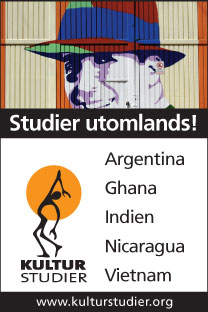 Twice a year KULTURSTUDIER
(Culture Studies) offers a full semester course (30 ECTS) in Peace
and Conflict Studies, to be carried out in Puducherry
(Pondicherry) on the southeastern coast of India. KULTURSTUDIER is
an organisation run by a group of social scientists and humanists
whose background is from the University of Oslo. Since 1997
it provides the opportunity to combine studies of high academic
standard in an environment that offers great learning experiences
in third world countries, including India. The Puducherry course is run in cooperation
with Oslo University College and Vestfold
University College. It is offers
twice per year, starting in August and January. The course gives a broad interdisciplinary introduction to the study of social and political processes of conflict and conflict resolution on a local, regional and global scale. Students and teachers come from all over the world. 10 weeks of studies in India are preceded by 5 weeks of self-study with internet-based supervision.
Twice a year KULTURSTUDIER
(Culture Studies) offers a full semester course (30 ECTS) in Peace
and Conflict Studies, to be carried out in Puducherry
(Pondicherry) on the southeastern coast of India. KULTURSTUDIER is
an organisation run by a group of social scientists and humanists
whose background is from the University of Oslo. Since 1997
it provides the opportunity to combine studies of high academic
standard in an environment that offers great learning experiences
in third world countries, including India. The Puducherry course is run in cooperation
with Oslo University College and Vestfold
University College. It is offers
twice per year, starting in August and January. The course gives a broad interdisciplinary introduction to the study of social and political processes of conflict and conflict resolution on a local, regional and global scale. Students and teachers come from all over the world. 10 weeks of studies in India are preceded by 5 weeks of self-study with internet-based supervision.
The collaboration with with Oslo University College makes it possible to issue Internationally transferable university credits. The course is suitable for both for students who wish to include the discipline of peace studies as a part of a bachelor degree, and professionals (teachers, diplomats, etc.) and others who seek further education in international and multicultural issues.
Full
information about the Peace and Conflict Studies course .
From the Fall semester 2011, Kulturstudier starts another 30 ECTS credits programme in Anthropology and Religious Studies on Bachelor’s level at Puducherry, again in collaboration with with Oslo University College. The new course focuses on Religion, Power, Politics and South Asia. The programme starts on Monday 29 August 2011.
Full
information about the Anthropology and Religious Studies course .
Swedish students are welcome to participate in the Puducherry semester programmes. Information meetings are therefore held at several Swedish universities (Stockholm, Uppsala, Lund, Malmö and Gothenburg) during the spring 2011. Go for the schedule of the information meetings in Sweden.
• 17th ASEF University in Penang focuses on Cultural Heritage
 The Asia-Europe Foundation (ASEF) invites to its 17th ASEF University (AU17) with the theme “Cultural Heritage: Challenges and Opportunities”, to be held in Georgetown, Penang, Malaysia, 19–30 June 2011. The programme, co-organised with the University Sains Malaysia (USM), will gather up to 46 promising young people from Asia and Europe to explore their ideas on various topics related to the theme. During this two-week programme, the participants will discuss topics such as the notion of a shared Asia and Europe heritage, various initiatives in heritage management and engaging the youth in its preservation.
The Asia-Europe Foundation (ASEF) invites to its 17th ASEF University (AU17) with the theme “Cultural Heritage: Challenges and Opportunities”, to be held in Georgetown, Penang, Malaysia, 19–30 June 2011. The programme, co-organised with the University Sains Malaysia (USM), will gather up to 46 promising young people from Asia and Europe to explore their ideas on various topics related to the theme. During this two-week programme, the participants will discuss topics such as the notion of a shared Asia and Europe heritage, various initiatives in heritage management and engaging the youth in its preservation.
Since 1998, the ASEF University programme has facilitated intercultural exchanges among undergraduate and graduate students and young professionals from Asia and Europe. Since 2006, India and Pakistan are also included in the programme. One of the programme’s key successes is that it facilitates meaningful exchanges and lasting friendships among its participants. More information about the 17th ASEF University.
Joint Lund/Gothenburg Indian field course in Religious Studies
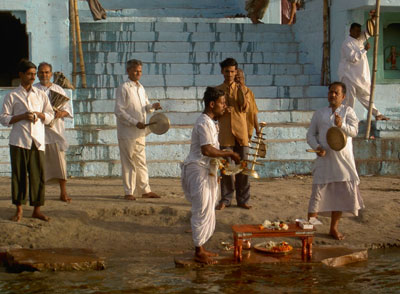 During the spring 2011, the Dept. of History and Anthropology
of Religion (including Judaism and Indic Religions) at Lund University, and the Dept. of Literature, History of Ideas and Religion at Gothenburg University jointly organises a 15 ECTS field course in Religious Studies, including five weeks of field work in India. The course is divided into two parts: firstly the students explore different methods and theories of conducting fieldwork in Religious studies and prepare minor research projects. Secondly the students carry out their projects in the field and write research reports. The field work can be conducted anywhere, but the two departments at Lund University and Gothenburg University provide supervision for those who travel to India. Students can attend the course at either of the two universities.
During the spring 2011, the Dept. of History and Anthropology
of Religion (including Judaism and Indic Religions) at Lund University, and the Dept. of Literature, History of Ideas and Religion at Gothenburg University jointly organises a 15 ECTS field course in Religious Studies, including five weeks of field work in India. The course is divided into two parts: firstly the students explore different methods and theories of conducting fieldwork in Religious studies and prepare minor research projects. Secondly the students carry out their projects in the field and write research reports. The field work can be conducted anywhere, but the two departments at Lund University and Gothenburg University provide supervision for those who travel to India. Students can attend the course at either of the two universities.
Full information in the course folder (only in Swedish)
Follow the current field course in India on Facebook.
• Time to apply for 2011 History of Indian Philosophy course at Södertörn
The School of Culture and Communication, Södertörns högskola, again organises a 15 ECTS course in History of Indian Philosophy, taught by Dr. Anna-Pya Sjödin, during the Fall semester 2011. It is the first course of its kind in Sweden. It focuses on the Buddhist, Hindu, Materialist, and Sceptical traditions that have existed in India for a long time, starting with Vedic metaphysical speculations 3,500 years ago, and ends up with today’s postcolonial theories. The course is aimed at students within the humanities, mainly Philosophy, Science of Religion, and from History of Ideas. Deadline for applications: 15 April every year. More information.
• Trainee programme on Ecology and Solidarity at Biskops-Arnö Folk High School
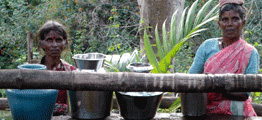 Nordens Folkhögskola Biskops-Arnö again offers a
36 weeks trainee programme on Ecology and Solidarity during the period August 2011 – May 2012.
The programme is intended for students who already have a degree in development studies or environmental studies. It is organised by Nordens Folkhögskola in collaboration with the Swedish
NGO Framtidsjorden and
its network in India. The costs are fully funded by the Swedish International Development Cooperation Agency, Sida.
Nordens Folkhögskola Biskops-Arnö again offers a
36 weeks trainee programme on Ecology and Solidarity during the period August 2011 – May 2012.
The programme is intended for students who already have a degree in development studies or environmental studies. It is organised by Nordens Folkhögskola in collaboration with the Swedish
NGO Framtidsjorden and
its network in India. The costs are fully funded by the Swedish International Development Cooperation Agency, Sida.
The first part of the course consists of nine weeks of studies and preparations at Sida Civil Society Course Centre in Härnösand, upon which follows five months of practical work in India, where
the students will work with local organisations engaged in projects to create an ecologically and socially
sustainable society. Finally, the students will do six weeks external information work in Sweden. A total number of seven participants will be accepted for the programme. The programme sis coordinated by Robert Norman.
Last date for applications is Tuesday 15 April 2011. More information.
• Österlen Folk High School now in collaboration with Malmö University
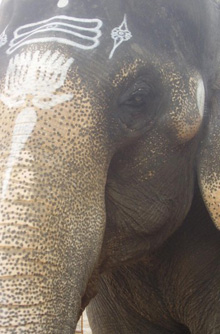 As usual, Österlen folk high school in Tomelilla starts a new
one-year course on India/South
Asiain August 2011. Such courses have been arranged every
year since 2001. Till 2007, they were organised as an academic undergraduate social science course in co-operation with the Dept.
of Sociology at Lund University, but from 2010 it is run in collaboration with the Global Political Studies programme at University of Malmö. The programme starts in August, with field work in south
India during the period January–March
coming year. After an initial common course at Kerala the students
visit different places in India and Bangladesh where
they make individual field work. The students give regular
reports through Internet travel diaries.
Applications can be submitted throughout the year for coming courses. The programme is coordinated by Jens Karlsson. More
information.
As usual, Österlen folk high school in Tomelilla starts a new
one-year course on India/South
Asiain August 2011. Such courses have been arranged every
year since 2001. Till 2007, they were organised as an academic undergraduate social science course in co-operation with the Dept.
of Sociology at Lund University, but from 2010 it is run in collaboration with the Global Political Studies programme at University of Malmö. The programme starts in August, with field work in south
India during the period January–March
coming year. After an initial common course at Kerala the students
visit different places in India and Bangladesh where
they make individual field work. The students give regular
reports through Internet travel diaries.
Applications can be submitted throughout the year for coming courses. The programme is coordinated by Jens Karlsson. More
information.
• Time to apply for Hålland’s Development Studies course
Hållands Folkhögskola, a Christian folk high school in Åre, Jämtland, organises a
one year Development studies course (”U-landslinjen”) every year, starting in August. The course includes a two months stay in either India or Tanzania during the Spring semester. The subjects taught include Missionary research, Hindi (or Swahili), Development studies, and Cultural understanding. The next programme will run from 28 August 2011 till 30 May 2012. Deadline for applications is 30 April 2011. The programme is coordinated by Hans Bolin. More
information.

• Ljungskile Folk High School students travels to North India
Ljungskile Folk High School again organises its World course (”Världens kurs – distans med
Indienresa”) on Justice, Peace and Environment,
including a three weeks tour to north India during the period 15 August 2011 – 15 January 2012. The tour includes a stay at the village folk
high school Jagriti Vihara in Ranchi, Jharkhand. Deadline for applications is 30 April 2011. The programme is coordinated by Eva Erlandsson. More
information.
• More information about South Asia related
education at Swedish and Nordic universities
See SASNET’s page, http://www.sasnet.lu.se/education.html
• Shireen Huq keynote speaker at BASAS conference in Southampton
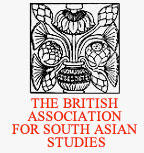 The 25th Annual British Association of South Asian Studies (BASAS) Conference will be held at the
University of Southampton, UK, 11–13 April 2011. The theme for the conference is ”Bodies of Power, Forms of Power: South Asia through History and Across Disciplines”. It aims to lay bare the diverse and complex ways in which power is and has been negotiated in the South Asia region. Through the key terms of 'bodies' and 'forms', it is meant to encourage interdisciplinary conversations about the ways in which power is understood, endorsed and undermined in both everyday lives, and at fraught moments of South Asian history. The keynote speaker is Shireen Huq, Coordinator for Naripokkho, a Bangladeshi activist organisation founded in 1983, working for the advancement of women's rights and entitlements and building resistance against violence, discrimination and injustice.
The 25th Annual British Association of South Asian Studies (BASAS) Conference will be held at the
University of Southampton, UK, 11–13 April 2011. The theme for the conference is ”Bodies of Power, Forms of Power: South Asia through History and Across Disciplines”. It aims to lay bare the diverse and complex ways in which power is and has been negotiated in the South Asia region. Through the key terms of 'bodies' and 'forms', it is meant to encourage interdisciplinary conversations about the ways in which power is understood, endorsed and undermined in both everyday lives, and at fraught moments of South Asian history. The keynote speaker is Shireen Huq, Coordinator for Naripokkho, a Bangladeshi activist organisation founded in 1983, working for the advancement of women's rights and entitlements and building resistance against violence, discrimination and injustice.
The Academics for Plenary and Key sessions are: Professor Lakshmi Subramanian (Centre for Studies in Social Sciences, Calcutta), Dr. Dina Siddiqui (BRAC University, Bangladesh), Dr. Dia Da Costa (Queen's University Canada), Professor Mohammed Waseem (Lahore University of Management Sciences, Pakistan), Professor Imran Ali (Lahore University of Managament Sciences, Pakistan), and Professor Neloufer de Mel (University of Colombo).
More information on the 2011 BASAS conference.
• Uppsala conference focuses on Global Civil Society
 An International conference on ”Global Civil Society –
Shifting Powers in a Shifting World” is held in Uppsala on 12–13 April 2011. It is organized by the Uppsala Centre for Sustainable Development (CSD) at Uppsala University, in cooperation with Dag Hammarskjöld Foundation and the Swedish International Development Cooperation Agency (Sida) and its Team Civil Society. Social movements and other forms of civil associations increasingly connect transnationally to mobilise political pressure, resources and other forms of support. Transnational civil society organisations and networks have also become important actors on the international political arena, striving to affect agendas and policies of UN bodies, trade organisations and corporations. These global networks have strengthened the impact of civil society actors vis-à-vis political decision-makers at local as well as national and international levels. This conference addresses these various power relations, and what effect they have on social and political change. Researchers, actors in international development cooperation, activists, and others with interest in the issues are invited to participate and make presentations.
An International conference on ”Global Civil Society –
Shifting Powers in a Shifting World” is held in Uppsala on 12–13 April 2011. It is organized by the Uppsala Centre for Sustainable Development (CSD) at Uppsala University, in cooperation with Dag Hammarskjöld Foundation and the Swedish International Development Cooperation Agency (Sida) and its Team Civil Society. Social movements and other forms of civil associations increasingly connect transnationally to mobilise political pressure, resources and other forms of support. Transnational civil society organisations and networks have also become important actors on the international political arena, striving to affect agendas and policies of UN bodies, trade organisations and corporations. These global networks have strengthened the impact of civil society actors vis-à-vis political decision-makers at local as well as national and international levels. This conference addresses these various power relations, and what effect they have on social and political change. Researchers, actors in international development cooperation, activists, and others with interest in the issues are invited to participate and make presentations.
 Kumi Naidoo (photo) from Greenpeace International, and earlier CIVICUS, is one of the keynote speakers. He will talk about ”Power relations within global civil society: north-south and south-south cooperation”. A series of participatory parallel sessions will also be held, on Social movements in a neoliberal era: – Ethnographies of local activists in transnational networks; – Diaspora, transnational engagement and the national regimes; – Globalisation and trade union internationalism; and – The implications of the growing clout of emerging powers for civil society. The first session will be chaired by Dr. Eva-Maria Hardtmann, Department of Social Anthropology, Stockholm University.
Venue: Missionskyrkan, S: Olofsgatan 40, Uppsala. Full information on the conference web page.
Kumi Naidoo (photo) from Greenpeace International, and earlier CIVICUS, is one of the keynote speakers. He will talk about ”Power relations within global civil society: north-south and south-south cooperation”. A series of participatory parallel sessions will also be held, on Social movements in a neoliberal era: – Ethnographies of local activists in transnational networks; – Diaspora, transnational engagement and the national regimes; – Globalisation and trade union internationalism; and – The implications of the growing clout of emerging powers for civil society. The first session will be chaired by Dr. Eva-Maria Hardtmann, Department of Social Anthropology, Stockholm University.
Venue: Missionskyrkan, S: Olofsgatan 40, Uppsala. Full information on the conference web page.
• North Carolina conference on contested 1947 Indo-Pakistani border
 A joint Duke/North Carolina State University (NCSU) conference on ”Midnight's Images: Spatial and Artistic Imaginings around a Contested Border” is held at NCSU in Raleigh on 15–16 April 2011. This inter-disciplinary conference re-examines conflicted meanings of the borders that
divided British India at the stroke of midnight on August 14-15, 1947 to
produce the new states of India and Pakistan. British India's partition,
and the violence that surrounded it, has been the subject of considerable
scholarship and debate among a range of scholars across the social
sciences and the humanities. The conference seeks to bring together scholars who
work on the textual and image archives generated around this contentious
event to explore themes and issues shared by the verbal and visual
A joint Duke/North Carolina State University (NCSU) conference on ”Midnight's Images: Spatial and Artistic Imaginings around a Contested Border” is held at NCSU in Raleigh on 15–16 April 2011. This inter-disciplinary conference re-examines conflicted meanings of the borders that
divided British India at the stroke of midnight on August 14-15, 1947 to
produce the new states of India and Pakistan. British India's partition,
and the violence that surrounded it, has been the subject of considerable
scholarship and debate among a range of scholars across the social
sciences and the humanities. The conference seeks to bring together scholars who
work on the textual and image archives generated around this contentious
event to explore themes and issues shared by the verbal and visual
registers, as well as the divergences, silences and invisibilities. It is organised by David
Gilmartin at NCSU and Sumathi Ramaswamy, Duke University. Speakers include Gayatri Sinha, Independent curator and art critic, New Delhi, who presents a paper on ”Partition and the Patriarchal State: Images in Indian Art from the 1940s to the Present”; and Vinayak Chaturvedi, University of California, Irvine, who presents a paper on ”Hindutva Beyond the Borders”.
More information, including paper abstracts.
• Indo-Bangladeshi Tagore conference at Dhaka University
 An International Conference on ”Contemporarizing Tagore and the World” will be held in Dhaka, Bangladesh, 29 April – 1 May 2011 to celebrate the 150th Birth Anniversary of Rabindranath Tagore. The Indo-Bangladeshi conference is jointly organized by the Dept. of International Relations, University of Dhaka; Academy of Third World Studies at Jamia Millia Islamia University in New Delhi; and the Visva Bharati University in Shantiniketan, with generous support from the Indian Council for Cultural Relations (ICCR). The conference aims at reviving an interest in Tagore’s writings and thinking among the new generation in India and Bangladesh and among Tagore scholars abroad. Eminent as well as mid and junior level scholars, policymakers, and art and cultural activists all over the world are invited. The finalized papers will be published in the form of a scholarly volume.
An International Conference on ”Contemporarizing Tagore and the World” will be held in Dhaka, Bangladesh, 29 April – 1 May 2011 to celebrate the 150th Birth Anniversary of Rabindranath Tagore. The Indo-Bangladeshi conference is jointly organized by the Dept. of International Relations, University of Dhaka; Academy of Third World Studies at Jamia Millia Islamia University in New Delhi; and the Visva Bharati University in Shantiniketan, with generous support from the Indian Council for Cultural Relations (ICCR). The conference aims at reviving an interest in Tagore’s writings and thinking among the new generation in India and Bangladesh and among Tagore scholars abroad. Eminent as well as mid and junior level scholars, policymakers, and art and cultural activists all over the world are invited. The finalized papers will be published in the form of a scholarly volume.
At the end of the Conference, personalities from both India and Bangladesh who have made a signal contribution to scholarship on Tagore and to keeping his heritage alive, will be honoured in an appropriate manner. During the Conference cultural programmes will be held in which artists from both the countries will give performances.
More information.
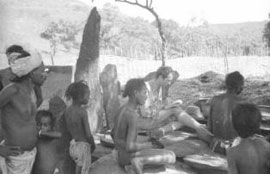 |
| Professor Christoph von Fürer-Haimendorf (1909-1995) sitting among Gond (Adivasi) men in central India, early 1940s, SOAS Archive. |
• Leipzig workshop on Anthropological Archival Knowledge
A two-day workshop on the 'Future of Anthropological Archival Knowledge: an International Reassessment' (KAAKIR) will be held at Museum für Völkerkunde in Leipzig, Germany on 10-11 May 2011. It is being organised by Dr Dan Rycroft of the School of World Art Studies & Museology, University of East Anglia in Norwich, UK. He has been awarded funding for a project to investigate how India’s cultural heritage has been archived by museums and consolidate practices across different institutions. The project focuses on the relationship between colonial anthropology, visual representation and Adivasi identity/heritage. If any anthropologists, artists, photographers, curators, archivists, etc. would like to know more about the project, please contact Dr. Rycroft, enclosing a CV.
The Leipzig workshop, funded by the Volkswagen Foundation, will gather museum curators, anthropologists and Adivasi (Indigenous) cultural activists to consider ways to re-interpret visual archives produced before India's independence concerning Indigenous and tribal heritage. More information.
• Bremen workshop on Globalization and Development in Asia
A Workshop on ”Globalization and Development in Asia” will be held at Jacobs University in Bremen, Germany, on Friday 13 May 2011. It is being organised by Satyanarayana Adapa, DAAD Visiting Professor of South Asian History at the university’s School of Humanities and Social Sciences. “The Dragon” and “the Elephant” symbolize the rise of two Asian economic giants, China and India, in the context of present day globalization. They experienced varied paths of development and witnessed fundamental transformation in the last quarter of the twentieth century. It has been observed that in the recent past both countries have experienced "diversified, expanded, [and] accelerated economic growth, improved standards of living and substantially improved qualities of life". Yet there are crucial differences between these two countries in socio-cultural and politico-economic policies, administrative structures, domestic policies and governance. The workshop will study the dynamics of the multiple paths of development in South and East Asia. Abstracts should be submitted before 15 April 2011. More information.
 • Vilnius conference on Body in the Cinemas of South Asia
• Vilnius conference on Body in the Cinemas of South Asia
An International conference on ”The Body in the Cinemas of South Asia” will be held at Vilnius University in Lithuania 30 June – 2 July 2011. It is being organised by the university’s Centre of Oriental Studies, and aims at bringing together and promoting dialogue between scholars based in Western European countries, Asia and the US, and scholars from Eastern Europe. Papers focusing on popular South Asian cinemas and discussions of what ‘exploitation cinema’ is or might be in industrial contexts are invited. Deadline for abstracts is 15 April 2011. More information.
• 2011 World Water Week focuses on Water in an Urbanising World
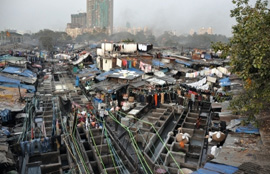 The 2011 World Water Week in Stockholm will be held 21–27 August 2011. The theme for 2011 is ”Responding to Global Changes – Water in an Urbanising World”. The21st World Water Week is as usual organised by the Stockholm International Water Institute (SIWI).
The 2011 World Water Week in Stockholm will be held 21–27 August 2011. The theme for 2011 is ”Responding to Global Changes – Water in an Urbanising World”. The21st World Water Week is as usual organised by the Stockholm International Water Institute (SIWI).
It is the leading annual global meeting place for capacity-building,
partnership-building and follow-up on the implementation of international
processes and programmes in water and development, with large relevance
to South Asia. The conference is filled with plenary sessions, seminars, workshops,
side events and special activities.
The Scientific Programme Committee (SPC) planning for the conference is chaired by Prof. Jan Lundqvist at SIWI (previously at the Dept. of Water and Environmental Studies, Linköping
University). Venue: Stockholm
International Fairs and Congress Center (Stockholmsmässan) in Älvsjö, 9 km south of central Stockholm.
The planning for 2011 is currently in motion at SIWI. At the 2011 World Water Week eight workshops will be held. They focus on: – Cities in a 3-D Landscape Perspective – Hidden Risks; – Need for a Paradigm Shift: New Technologies and New Lifestyles: – Water for Sustainable Urban Growth; – The Urban Shadow ; – Regulatory and Social Contexts for Institutional Performance; – Financing Urban Infrastructure; – Adapting Cities to Climate Variability and Change; and – Urban Inequities: Service Delivery and Social Development.
More information on the WWW 2011.
 • 17th Himalayan Languages Symposium in Kobe
• 17th Himalayan Languages Symposium in Kobe
The 17th Himalayan Languages Symposium (HLS) will be held in Kobe, Japan, 6–9 September 2011. It is being hosted by Kobe City University of Foreign Studies, on behalf of the Forum for Scholars of Himalayan Languages. HLS is an annually convening, open scholarly forum for scholars of Himalayan languages. Contributions are welcome on any language of the greater Himalayan region, e.g. Burushaski, Kusunda, Tibeto-Burman, Indo-Iranian, Austroasiatic, Kradai, Andamanese, Nahali, Dravidian or any other language of the area. In addition to linguistic presentations, contribution are also welcome from related disciplines such as history, anthropology, archaeology and prehistory. The forum is secular and scholarly and not open to political or religious contributions. Deadline of submitting abstracts is 15 April 2011. More information.
• Himalayan Studies conference to be held in Saint Paul
 The First Association for Nepal and Himalayan Studies (ANHS) Himalayan Studies Conference will be held at Macalester
College in Saint Paul, Minnesota, USA, in conjunction with the 60th Annual
Midwest Conference on Asian Affairs, 28–30 October 2011. The
theme of the conference will be ”Rethinking the Himalaya: The Indo-Tibetan Interface and Beyond”. The conference marks ANHS’ new
relationship with the Council of American Overseas Research Centers as a
Center in Developing Status. Deadline for submitting abstracts is 1 June 2011. More information.
The First Association for Nepal and Himalayan Studies (ANHS) Himalayan Studies Conference will be held at Macalester
College in Saint Paul, Minnesota, USA, in conjunction with the 60th Annual
Midwest Conference on Asian Affairs, 28–30 October 2011. The
theme of the conference will be ”Rethinking the Himalaya: The Indo-Tibetan Interface and Beyond”. The conference marks ANHS’ new
relationship with the Council of American Overseas Research Centers as a
Center in Developing Status. Deadline for submitting abstracts is 1 June 2011. More information.
• 17th International Euro-Asia Research Conference to be held in New Delhi
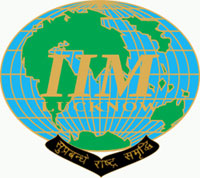 The 17th International Euro-Asia Research Conference will be held in New Delhi, India, 28–29 October 2011. The theme for the conference will be ”Global Networking and its Implications for Euro-Asia Business Management and Research”. Following a number of conferences held in France, Ireland, Norway, Japan, China, Spain and Indonesia since 1994, the Seventeenth International Euro-Asia Research Conference intends to bring together researchers engaged in Management, Economics and related fields from Europe, Asia and other parts of the World. Doctoral students are also strongly encouraged to submit papers for consideration.
The 17th International Euro-Asia Research Conference will be held in New Delhi, India, 28–29 October 2011. The theme for the conference will be ”Global Networking and its Implications for Euro-Asia Business Management and Research”. Following a number of conferences held in France, Ireland, Norway, Japan, China, Spain and Indonesia since 1994, the Seventeenth International Euro-Asia Research Conference intends to bring together researchers engaged in Management, Economics and related fields from Europe, Asia and other parts of the World. Doctoral students are also strongly encouraged to submit papers for consideration.
The research conference is a joint undertaking between the Indian Institute of Management (IIM), Lucknow, India; Yokohama National University, Japan; University of Poitiers, University of Pau, and TELECOM Ecole de Management, France; School of East Asian Studies, University of Sheffield, UK; and University of Limerick, Ireland. The conference hosted by IIM Lucknow at its Noida campus, outside New Delhi.
More information.
• Canary Islands conference on Richness of Indian Multiplicity
 The Spanish Association for Interdisciplinary India Studies (AEEII) organises its second international conference, entitled ”‘Other’ Indias: The Richness of Indian Multiplicity” on 23–26
November 2011. The conference will be hosted by the University of La Laguna (Facultad de Filolog’a & Dept of English and German Studies) at the Canary Island of Tenerife, Spain. Papers from a variety of fields (including politics, literary criticism, sociology, philosophy, history, ecology, anthropology, technology, economics, and others) which consider the multiplicity of the Indian mosaic are welcome. Proposals that look into the ways in which India (and the Indian subcontinent) is represented and explored, with special emphasis on difference in plurality, and diversity in unity is especially invited. Complete affiliation of author(s), and paper title, as well as telephone, fax, mail and e-mail addresses, should be submitted before June 30, 2011. More information will soon appear on the conference’s facebook page.
The Spanish Association for Interdisciplinary India Studies (AEEII) organises its second international conference, entitled ”‘Other’ Indias: The Richness of Indian Multiplicity” on 23–26
November 2011. The conference will be hosted by the University of La Laguna (Facultad de Filolog’a & Dept of English and German Studies) at the Canary Island of Tenerife, Spain. Papers from a variety of fields (including politics, literary criticism, sociology, philosophy, history, ecology, anthropology, technology, economics, and others) which consider the multiplicity of the Indian mosaic are welcome. Proposals that look into the ways in which India (and the Indian subcontinent) is represented and explored, with special emphasis on difference in plurality, and diversity in unity is especially invited. Complete affiliation of author(s), and paper title, as well as telephone, fax, mail and e-mail addresses, should be submitted before June 30, 2011. More information will soon appear on the conference’s facebook page.
• Bangalore conference on Spiritual Challenge in Management
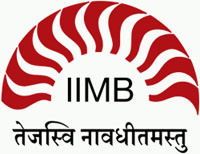 The Indian Institute of Management Bangalore (IIMB) hosts an international conference on ”The Spiritual Challenge in Management: What is to be Done?” at the IIMB Campus in Bangalore on 9–11 January 2012. The conference is organised in collaboration with the Journal of Management, Spirituality and Religion. It is convened by Prof. Ramnath Narayanswamy, IIMB, and Prof. Yochanan Altman, Bordeaux Management School (BEM), France.
The conference will address and question a key issue of our times: the adequacy of the current paradigms of management for the future of mankind and our planet. The positioning of the conference in India is signaling the issue we are questioning: is the Western model of management the best suited for the challenges we face? What can West and East learn from each other? And how does the new epoch of spirituality fit into these new emerging agendas? More information on the conference web page.
The Indian Institute of Management Bangalore (IIMB) hosts an international conference on ”The Spiritual Challenge in Management: What is to be Done?” at the IIMB Campus in Bangalore on 9–11 January 2012. The conference is organised in collaboration with the Journal of Management, Spirituality and Religion. It is convened by Prof. Ramnath Narayanswamy, IIMB, and Prof. Yochanan Altman, Bordeaux Management School (BEM), France.
The conference will address and question a key issue of our times: the adequacy of the current paradigms of management for the future of mankind and our planet. The positioning of the conference in India is signaling the issue we are questioning: is the Western model of management the best suited for the challenges we face? What can West and East learn from each other? And how does the new epoch of spirituality fit into these new emerging agendas? More information on the conference web page.
• Time to suggest panels for 22nd EASAS conference in Lisbon
 The 22nd European Conference on South Asian Studies (ECSAS) is scheduled for 25-28 July 2012 at the University Institute of
Lisbon (also known as ISCTE-IUL) in Portugal. The main conference organiser is Professor Rosa Maria Perez, of the Department of Anthropology, supported by a local scientific steering committee. The venue of the conference will be on the university’s main campus in Lisbon.
The 22nd European Conference on South Asian Studies (ECSAS) is scheduled for 25-28 July 2012 at the University Institute of
Lisbon (also known as ISCTE-IUL) in Portugal. The main conference organiser is Professor Rosa Maria Perez, of the Department of Anthropology, supported by a local scientific steering committee. The venue of the conference will be on the university’s main campus in Lisbon.
The biannual ECSAS conference is the largest gathering of South Asia oriented researchers in Europe, covering all fields from the humanities and social sciences to technology, natural sciences and medicine. The conference is held biannually under the aegis of the European Association of South Asian Studies (EASAS), a professional, non-profit organisation of scholars engaged in research and teaching concerning South Asia with regard to all periods and fields of study. (SASNET organised the 18th ECMSAS conference in Lund in 2004.)
Suggestions for panels are currently accepted for the Lisbon conference. They should be sent as Word documents to ecsas22@ed.ac.uk, and include: – Panel name (tentative): – Panel description (100 words maximum): – Your name, postal and email address: – Your professional affiliation: – List of participants (tentative). Deadline for panel suggestions is 15 April 2011.
The steering committee will then meet in May to decide on the panels to be accepted, and the selected panels will be presented most probably towards the end of May 2011. Full information on the conference page.
• Other conferences connected to South Asian
studies all over the World
See SASNET’s page, http://www.sasnet.lu.se/conferences.html#conf
Important lectures and seminars in Scandinavia
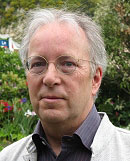 • Martin Fuchs lectures in Oslo on Sociology of Indian Religion
• Martin Fuchs lectures in Oslo on Sociology of Indian Religion
Martin Fuchs, Professor for the History of Indian Religion at the Max-Weber-Kolleg, University of Erfurt, Germany, lectures on ”The Sociology of Indian Religion, or: What Can Social Theory learn from Bhakti?” at University of Oslo on Monday 11 April 2011, 12.15–14.00. Prof. Fuchs’ main areas of research – reflected in a large number of book and article publications – are culture and social theory, anthropology of South Asia, sociology and study of religions, social and religious movements, Dalits, and urban anthropology.
Bhakti was one of the least understood areas of Indian religion for a long time. Sociologists in particular found it difficult to build bhakti into their conceptualisations of Indian society and Indian religion. This presentation will discuss the works of the most renowned sociologists of Indian religions, Max Weber and Louis Dumont, and their understanding of bhakti. It will then suggest a different interpretation of bhakti based on recent cultural studies approaches to bhakti. Venue :P A Munchs hus, room 12, University of Oslo, Blindern.
• Sushil Khanna lectures at Second Annual ICCR-CBS Lecture in Copenhagen
 Professor Sushil Khanna, Indian Council of Cultural Relations (ICCR) Visiting Professor at the Asia Research Centre, Copenhagen Business School (CBS), will hold the Second Annual ICCR-CBS Lecture on Monday 11 April 2011, 15.00–17.00. Prof. Khanna will speak about ”Corporate Control and Governance in India”, focusing on the new forms of Corporate Control and Governance against the background of changing Indian business environment – from one of ‘socialist’ goals to celebrating the expansion and internationalization of large private firms. In contrast to the western situation, where the issue of corporate governance is seen as a problem of controlling managers, the bulk of business in India (and in other Asian countries) because they are family owned and managed raise several new issues of control and governance. Khanna argues that concentrated family ownership mitigates some of the problems of governance but raises new ones.
Professor Sushil Khanna, Indian Council of Cultural Relations (ICCR) Visiting Professor at the Asia Research Centre, Copenhagen Business School (CBS), will hold the Second Annual ICCR-CBS Lecture on Monday 11 April 2011, 15.00–17.00. Prof. Khanna will speak about ”Corporate Control and Governance in India”, focusing on the new forms of Corporate Control and Governance against the background of changing Indian business environment – from one of ‘socialist’ goals to celebrating the expansion and internationalization of large private firms. In contrast to the western situation, where the issue of corporate governance is seen as a problem of controlling managers, the bulk of business in India (and in other Asian countries) because they are family owned and managed raise several new issues of control and governance. Khanna argues that concentrated family ownership mitigates some of the problems of governance but raises new ones.
Sushil Khanna is Professor of Economics and Strategic Management at the Indian Institute of Management (IIM) in Kolkata, where he has taught for last 25 years.
Venue for the seminar: Faculty Club (ground Floor), CBS, Dalgas Have 15, Frederiksberg (Copenhagen). Full information.
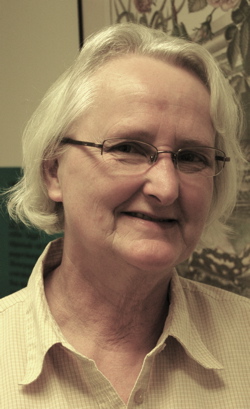 • Gunilla Gren-Eklund lectures on History of Indological Learning in Uppsala
• Gunilla Gren-Eklund lectures on History of Indological Learning in Uppsala
The Higher Seminar in Indology at Uppsala University invites to a seminar with Professor Emeritus Gunilla Gren-Eklund on ”History of Indological Learning in Uppsala” on Wednesday 13 April 2011, 17.15–18.45. Gunilla Gren-Eklund retired from the Department of Linguistics
and Philology in 2003. She has been involved
in a large number of research projects through the years within the fields
of Indian Philosophy (especially logics, language philosophy and grammar),
the diffusion of Indian cultural traditions in South East Asia, Indo-European,
Indic and Burmese language structures, and Indian cultural phenomena
in general (more information). Venue: Engelska Parken, room 9-3042.
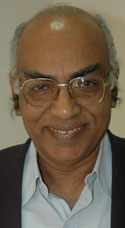 • George Mathew lectures in Olso on the Indian Panchayati Raj reform
• George Mathew lectures in Olso on the Indian Panchayati Raj reform
Dr. George Mathew, Director for the Institute of Social Sciences (ISS) in New Delhi, India, will be the key presenter at a seminar in Oslo on Monday 18 April 2011. The seminar focuses on ”The Social Impacts of the 1992 Constitutional Reforms on participation by women and formerly scheduled castes in Local Government (Panchayati Raj) in India”, and is jointly organised by the Norwegian Agricultural Economics Research Institute (NILF), and the Information Centre for Gender Research in Norway (KILDEN). As part of the seminar, the film ”Swarja” (The Little Republic) will be screened. Venue: Norwegian Research Council premises, Stensberggata 26, Oslo. Full information.
• Stockholm University lecture on Defragmenting Asian Studies
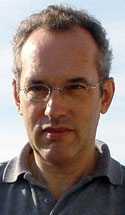 Prof. Willem van Schendel from the University of Amsterdam will lecture on "Defragmenting Asian Studies? The Case of Northeast India" at Stockholm University on Monday 16 May 2011. Prof. Schendel specializes in Modern Asian History and is also a Senior Research Fellow at the International Institute of Social History. The lecture is organised by the Dept. of Social Anthropology at Stockholm University and is part of its weekly research seminar series that are held every Monday, 13.00 - 15.00, until 30 May 2011. A number of lectures this term are dedicated on South Asia. All are welcome! Venue: Room B600, Dept. of Anthropology, Universitetsvägen 10 B, Frescati. See the complete programme for the spring 2011.
Prof. Willem van Schendel from the University of Amsterdam will lecture on "Defragmenting Asian Studies? The Case of Northeast India" at Stockholm University on Monday 16 May 2011. Prof. Schendel specializes in Modern Asian History and is also a Senior Research Fellow at the International Institute of Social History. The lecture is organised by the Dept. of Social Anthropology at Stockholm University and is part of its weekly research seminar series that are held every Monday, 13.00 - 15.00, until 30 May 2011. A number of lectures this term are dedicated on South Asia. All are welcome! Venue: Room B600, Dept. of Anthropology, Universitetsvägen 10 B, Frescati. See the complete programme for the spring 2011.
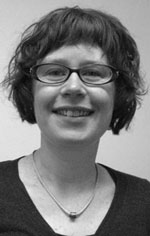
• Anna-Pya Sjödin lectures at Uppsala’s Higher Seminar in Indology
The Higher Seminar in Indology at Uppsala University invites to a seminar with Dr. Anna-Pya Sjödin on ”Terminology of the
Intrasubjective in Praastapdabhya, Nyyakandal and Vyomavat” on Wednesday 20 April 2011, 17.00–19.00. Dr. Sjödin defended her doctoral dissertation titled "The Happening of Tradition. Vallabha on Anumana in Nyayalilavati” in 2007. It dealt with the philosophical development of the Nyaya/Navya-nyaya school of Hinduism. She has later continued to do research in the same field (more information). Venue: Engelska Parken, room 9-3042.
• Oslo seminar on Warfare in South Asia
 The International Peace Research Institute (PRIO) in Oslo organises a book launch seminar on Warfare in South Asia with the researchers Scott Gates, Director for PRIO’s Centre for the Study of Civil War, and Kaushik Roy, Senior Researcher at the Dept. of History, Jadavpur University, Kolkata, on Thursday 28 April 2011, 12.00–13.30. The launch refers to three volumes published simultaneously under the heading ”Critical Essays on Warfare in South Asia, 1947 to the Present”, all edited by Gates and Roy. They include ”Conventional Warfare in South Asia, 1947 to the Present”; ”
Unconventional Warfare in South Asia, 1947 to the Present”; and ”The Nuclear Shadow over South Asia, 1947 to the Present”. Pre-registration necessary. Venue: PRIO, Hausmanns gate 7, Oslo.
The International Peace Research Institute (PRIO) in Oslo organises a book launch seminar on Warfare in South Asia with the researchers Scott Gates, Director for PRIO’s Centre for the Study of Civil War, and Kaushik Roy, Senior Researcher at the Dept. of History, Jadavpur University, Kolkata, on Thursday 28 April 2011, 12.00–13.30. The launch refers to three volumes published simultaneously under the heading ”Critical Essays on Warfare in South Asia, 1947 to the Present”, all edited by Gates and Roy. They include ”Conventional Warfare in South Asia, 1947 to the Present”; ”
Unconventional Warfare in South Asia, 1947 to the Present”; and ”The Nuclear Shadow over South Asia, 1947 to the Present”. Pre-registration necessary. Venue: PRIO, Hausmanns gate 7, Oslo.
More information about the book launch seminar.
• Copenhagen seminar onThe EU and Strategic Partnerships
 The Danish Institute for International Studies (DIIS) invites to a Lighthouse Europe Seminar on ”The EU and Strategic Partnerships” on
Thursday 28 April 2011, 14.00–16.00.
At the European Council meeting in September 2010, High Representative of the Union for Foreign Affairs and Security Policy Catherine Ashton put the topic of strategic partnerships on the agenda. The aim of the summit was to take full advantage of the opportunities provided by the Lisbon Treaty by boosting the dialogue on the global role of the EU.
The Danish Institute for International Studies (DIIS) invites to a Lighthouse Europe Seminar on ”The EU and Strategic Partnerships” on
Thursday 28 April 2011, 14.00–16.00.
At the European Council meeting in September 2010, High Representative of the Union for Foreign Affairs and Security Policy Catherine Ashton put the topic of strategic partnerships on the agenda. The aim of the summit was to take full advantage of the opportunities provided by the Lisbon Treaty by boosting the dialogue on the global role of the EU.
Strategic partnerships were one of the answers to this question. As the world is becoming increasingly multi-polar there is a need for the EU to strengthen dialogue and formal ties with the rising powers. Countries like China, India and Brazil are gaining influence economically as well as politically with a high speed and Europe is trying to find the best ways and means to deal with these countries.
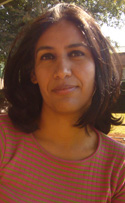 Strategic partnerships with a range of the rising powers seem to be the EU’s answer to this question. The precise definition of this concept, however, remains rather unclear. What does a strategic partnership mean and what does it entail? And who should be the EU’s partner? These are some of the questions that will be addressed in this seminar, which besides the general perspective will focus on two cases, EU-China relations and Denmark’s relations with India.
Strategic partnerships with a range of the rising powers seem to be the EU’s answer to this question. The precise definition of this concept, however, remains rather unclear. What does a strategic partnership mean and what does it entail? And who should be the EU’s partner? These are some of the questions that will be addressed in this seminar, which besides the general perspective will focus on two cases, EU-China relations and Denmark’s relations with India.
Speakers include Dr. Ravinder Kaur (photo), Associate Professor, Centre of Global South Asian Studies, University of Copenhagen.
Participation is free of charge, but registration is required before 27 April 2011. Venue: DIIS,
Main Auditorium,
Strandgade 71, ground floor, Copenhagen. More information about the seminar.
• Copenhagen lunch seminar with Ravinder Kaur
The Asian Dynamics Initiative(ADI) at Copenhagen University invites to a lunch lecture by Dr. Ravinder Kaur, Associate Professor at the Department of Cross-Cultural and Regional Studies and Director of the Centre of Global South Asian Studies. The title of her lecture is ”Design of a Nation: Making India Global”.
Date and time: 3 May 2011, 12.15–13.30.
Venue: Nordic institute of asian Studies (NIAS), Leifsgade 33, 3rd floor, Copenhagen.
You are welcome to bring your own lunch. ADI will provide small snacks.
• Public hearing on Kashmir in Danish parliament
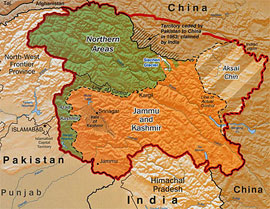 The Danish parliament’s standing committee on foreign affairs (Folketingets Udenrigsudvalg) organizes a public Hearing on the conflict in Kashmir on Wednesday 4 May 2011, 09.30 – 13.00. The purpose is to learn about the more than 60 years old historical and geographical conflict in Kashmir , and also to put it in a larger context of security policy with focus on extreme groups connected to Pakistan, Chechnya and Afghanistan. Another purpose with the hearing is to discuss future perspectives focusing on Kashmir, and to present possible models of conflict solution.
The Danish parliament’s standing committee on foreign affairs (Folketingets Udenrigsudvalg) organizes a public Hearing on the conflict in Kashmir on Wednesday 4 May 2011, 09.30 – 13.00. The purpose is to learn about the more than 60 years old historical and geographical conflict in Kashmir , and also to put it in a larger context of security policy with focus on extreme groups connected to Pakistan, Chechnya and Afghanistan. Another purpose with the hearing is to discuss future perspectives focusing on Kashmir, and to present possible models of conflict solution.
The invited speakers include Lars Erslev Andersen, Senior Researcher at Danish Institute of International Studies (DIIS); Qandeel Siddique, Analyst at DIIS; and Associate Professor Ravinder Kaur, University of Copenhagen, who will all discuss the regional security political context. They are followed by Professor Robert Bradnock, University College London/Chatham House; Martijn van Beek, Researcher at University of Aarhus; and Stig Toft Madsen, Senior Research Fellow at Nordic Institute of Asian Studies (NIAS), who will discuss the theme of ”Looking forward – Visions for Kashmir”.
The hearing is open to the public, but there are only a limited number of seats for audience and the security will be strict. Pre-registration is necessary, giving details about name and organization. Venue: Landstingssalen at Christiansborg, Copenhagen. More information about the hearing.
It will also be possible to follow the hearing via the Danish parliament’s web TV, go for it.
• Aarhus seminar on Picturing Punishment in India
Dr. Christopher Pinney from the Dept. of Anthropology, University College London, UK, holds a Saraswati Colloquium Guest Lecture at Aarhus University, Denmark, on Tuesday 3 May 2011, 14–16. The seminar, organised by the Contemporary India Study Centre Aarhus (CISCA), is entited ”Lessons from Hell: Picturing Punishment in India”. He will speak about ”Karni Bharni” images that embodied the importation of a Jain soteriology into mainstream Hinduism in the late nineteenth century. They depict punishments in hell for moral transgressions and eventually transmute, in the mid-twentieth century, into a parallel genre known as ”Ideal Body” which visualise codes of citizenship. The lecture explores the powerful "underneath" of this world of punishment and its role as a visual mode of governmentality. Dr. Abhijit Bhattacharya from the Centre for the Study of Social Sciences (CSSS) in Kolkata will be the discussant at the seminar. Venue: History and Area Studies Department, Aarhus University, building 1410, room 136 (Historisk Mødelokale). More information.
• Klaus Voll lectures on EU-India relations in Aarhus
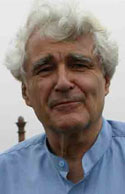 On Monday 9 May 2011, 15–17, the Contemporary India Study Centre Aarhus (CISCA) organises its 2nd Indo-European Lecture with Dr. Klaus Voll, Advisor on Asia, Foundation for European Progressive Studies
(FEPS) in New Delhi. He will speak about ”National Interest vs a European mosaic? A Constructive critique of EU-India relations” referring to the
mutual indifference of the Indo-European partnership in the past, depicting
existing shortcomings in mutual perceptions, according to leading European
and Indian analysts. India's role as a major powers is highlighted together with its world view and
its main foreign policy priorities. Which role do Europe as a whole and major
European nation states play in this context and are there marked differences?
What are the reasons that India prefers to deal with major European nation states individually?. The seminar is organised jointly with the Jean Monnet Centre at University of Aarhus. Venue: Aarhus University, Building 1162/013 (Fysiologisk Auditorium 1). More information.
On Monday 9 May 2011, 15–17, the Contemporary India Study Centre Aarhus (CISCA) organises its 2nd Indo-European Lecture with Dr. Klaus Voll, Advisor on Asia, Foundation for European Progressive Studies
(FEPS) in New Delhi. He will speak about ”National Interest vs a European mosaic? A Constructive critique of EU-India relations” referring to the
mutual indifference of the Indo-European partnership in the past, depicting
existing shortcomings in mutual perceptions, according to leading European
and Indian analysts. India's role as a major powers is highlighted together with its world view and
its main foreign policy priorities. Which role do Europe as a whole and major
European nation states play in this context and are there marked differences?
What are the reasons that India prefers to deal with major European nation states individually?. The seminar is organised jointly with the Jean Monnet Centre at University of Aarhus. Venue: Aarhus University, Building 1162/013 (Fysiologisk Auditorium 1). More information.
• Tryst With Democracy – Political Practice in South Asia seminar in Aarhus
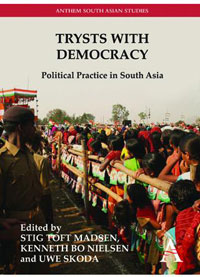 The Contemporary India Study Centre Aarhus (CISCA) at Aarhus University, Denmark, organises a seminar on the state of India's
democracy on Tuesday 10 May 2011, 13–15. The seminar, entitled ”Tryst With Democracy” is followed by the launch of a new book entitled 'Tryst With Democracy – Political Practice in South Asia', edited by Scandinavian South Asianists Stig Toft Madsen, Kenneth Bo Nielsen and Uwe Skoda.
The Contemporary India Study Centre Aarhus (CISCA) at Aarhus University, Denmark, organises a seminar on the state of India's
democracy on Tuesday 10 May 2011, 13–15. The seminar, entitled ”Tryst With Democracy” is followed by the launch of a new book entitled 'Tryst With Democracy – Political Practice in South Asia', edited by Scandinavian South Asianists Stig Toft Madsen, Kenneth Bo Nielsen and Uwe Skoda.
The seminar includes presentations by
Klaus Voll, Advisor on Asia, Foundation for European Progressive Studies (FEPS), New Delhi, who will speak about ”Current Trends in Indian Politics”, by Kenneth Bo Nielsen, Research Fellow at the Centre for Development and the Environment (SUM), University of Oslo, who will speak about ” The Decline of The Indian Left?”; and by Dr. Stig Toft Madsen, Nordic Institute of Asian Studies (NIAS), who will speak about ”Surprising India”
Venue: Aarhus University,
building 1410, room 247. More information.
• Information about South Asia related lectures and seminars
See SASNET's page, http://www.sasnet.lu.se/conferences.html
Business and Politics
Swedish government appoints High Representative for Environment Technology Cooperation in India Sweden is now further strengthening its capacity to promote collaboration between Sweden and India in the field of environmental technology. The Swedish Government has appointed a High Representative for strengthening Environmental Technology Cooperation between Sweden and India, Mr Mats Denninger (photo). As the High Representative, Mr Mats Denninger and his team will work closely with Swedish companies in Sweden and in India to facilitate and encourage enhanced contacts between businesses and between business and the public sector. Indian Biogas development and possible joint Indo-Swedish ventures will be of key interest for Mr Denninger and his team.
Sweden is now further strengthening its capacity to promote collaboration between Sweden and India in the field of environmental technology. The Swedish Government has appointed a High Representative for strengthening Environmental Technology Cooperation between Sweden and India, Mr Mats Denninger (photo). As the High Representative, Mr Mats Denninger and his team will work closely with Swedish companies in Sweden and in India to facilitate and encourage enhanced contacts between businesses and between business and the public sector. Indian Biogas development and possible joint Indo-Swedish ventures will be of key interest for Mr Denninger and his team. In these efforts, the Enviroment Technology Attaché Mr Mikael Kullman, based at the Swedish Embassy in New Delhi, will play an integral part.
News item from the April-June 2011 issue of Sweden Express, the quarterly newsletter of the Embassy of Sweden in India.
• Information about South Asia related business and politics in Sweden
See SASNET's page, http://www.sasnet.lu.se/polbuss.html
South Asia related culture in
Scandinavia
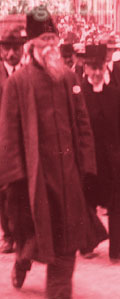 • Tagore 150th birth anniversary celebration in Uppsala, Gothenburg and Oslo
• Tagore 150th birth anniversary celebration in Uppsala, Gothenburg and Oslo
On Sunday 8 May 2011, 16–19, a Rabindranath Tagore 150 years anniversary celebration will be held in Uppsala. It is organized by the Uppsala University Seminar for South Asian Studies, and a programme has been prepared by Dr. Heinz Werner Wessler, Dept. of Linguistics and Philology. He will also hold a speech on Tagore’s life and work. Dr. Ferdinando Sardella, History of Religions, Faculty of Theology, will then lecture on Tagore and Religion.
(Photo from Tagore’s visit to Uppsala in 1921.)
Trio Creation, with Jonas Landahl, Suranjana Ghosh and Iti Malo, participates with a cultural program, and Tagore songs will be performed by Bubu Munshi Eklund. The event will be attended by the Ambassadors from both Bangladesh and India, Mr. Gousal Azam Sarker and Mr. Ashok Sajjanhar respectively. All are welcome. Venue: Ihresalen, Engelska parken, Thunbergsvägen 3 H. More information.
In Gothenburg, a Tagore 150th birthday celebration programme will be held on Saturday 7 May 2011, at 14.00. The programme includes poetry reading, Tagore songs and film show. It is being organised by Tagoresällskapet. The Ambassadors of both India and Bangladesh will also attend this event. Venue: Kulturhuset, Röda rummet,
Biblioteksgatan 2, Mölnlycke (11 km from Gothenburg). More information.
In Oslo, Robindrosenteret organises Rabindranath Tagore’s 150th Birthday Celebration on Sunday
8th May 2011, 18.00–19.30. The programme includes poetry recitations, Tagore songs, dance performances and paintings. Venue:
Marienlyst skoles Auditorium, Oslo, Norway. More information.
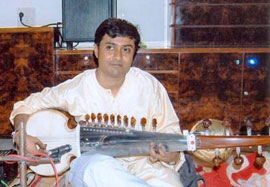 • Sarod maestro performs in Copenhagen
• Sarod maestro performs in Copenhagen
Apratim Majumdar, young Sarod player from Kolkata, India, will perform in Copenhagen, Denmark on Tuesday 3 May 2011, at 18.30. Mr. Majumdar, who has been trained under Partho Sarothy and Pradip Kumar Chakraborty, will be accompanied by the eminent Tabla player Amit Chatterjee, also from Kolkata. As usual, the concert is organised by Dansk Musikforening, contact person Annemette P. Karpen. Venue: Tranquebar Rejseboghandel og Café, Borgergade 14, Copenhagen. More information.
• Sixth Saraswathy Kalakendra Annual Day in Huddinge
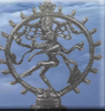 Saraswathy Kalakendra Institution of Fine Arts in Huddinge invites for its sixth Annual Day celebration on Saturday 7 May 2011, at 16.00. The Bharata Natyam dance school was started in 2004 by Usha Balasundaram, originally from Kerala and trained at the famous dance institution Kalakshetra College of Fine Arts in Chennai, India. During the annual day celebration, traditional folk dances of India and Bollywood dance were performed. Venue: ABF-huset, Huddinge (outside Stockholm). More information.
Saraswathy Kalakendra Institution of Fine Arts in Huddinge invites for its sixth Annual Day celebration on Saturday 7 May 2011, at 16.00. The Bharata Natyam dance school was started in 2004 by Usha Balasundaram, originally from Kerala and trained at the famous dance institution Kalakshetra College of Fine Arts in Chennai, India. During the annual day celebration, traditional folk dances of India and Bollywood dance were performed. Venue: ABF-huset, Huddinge (outside Stockholm). More information.
• More information about South Asia related culture
in Sweden/ Scandinavia
See SASNET’s page, http://www.sasnet.lu.se/culture.html
New and updated items on SASNET web site
• Swedish departments where research on
South Asia is going on:
Constantly added to the list of research environments at Swedish
universities, presented by SASNET. The full list now includes 275 departments,
with detailed descriptions of the South Asia related research and education
taking place! Go to http://www.sasnet.lu.se/environment.html
Best regards
Lars Eklund
Deputy director/webmaster
SASNET/Swedish South Asian Studies Network
SASNET is a national network for research, education, and information about South Asia and is based at Lund University. Its aim is to promote a dynamic networking process in which Swedish researchers cooperate with their counterparts in South Asia and around the globe.
The SASNET network is open to all branches of the natural and social sciences. Priority is given to interdisciplinary cooperation across faculties, and more particularly to institutions in the Nordic countries and South Asia. SASNET believes that South Asian studies will be most fruitfully pursued as a cooperative endeavour among researchers in different institutions who have a solid base in their mother disciplines.
The network is financed by Lund University.
Postal address: SASNET – Swedish South Asian Studies Network,
Scheelevägen 15 D, SE-223 70 Lund, Sweden
Visiting address: Ideon Research Park, House Alpha 1 (first floor,
room no. 2040), in the premises of the Centre for East and South
East Asian Studies at Lund University (ACE).
Phone: + 46 46 222 73 40
Fax: + 46 46 222 30 41
E-mail: sasnet@sasnet.lu.se
Web site:
http://www.sasnet.lu.se
SASNET - Swedish South Asian Studies Network/Lund
University
Address: Scheelevägen 15 D, SE-223 70 Lund, Sweden
Phone: +46 46 222 73 40
Webmaster: Lars Eklund
Last updated
2011-05-10